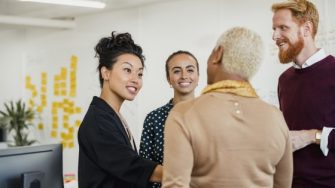
Across the globe, our Medicine & Health alumni are making extraordinary things happen. Our alumni are bound by their connection to UNSW, but their journeys are all beautifully distinct. From health system reform and optometry to exercise physiology and improving the health of local communities, discover how our alumni are making their mark.
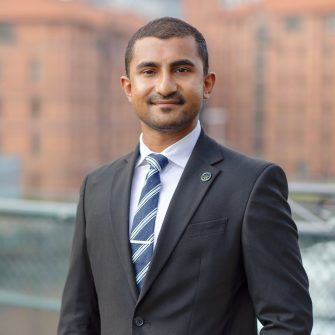
Adeel Shareef
Adeel Shareef
MHLM 2024 MGH 2024
Director, Strategy and Innovation, at ADK Hospital - Maldives
Vice President, Migrant Health, at Mission for Migrant Workers Maldives
A bit about me...
I am currently the Director, Strategy and Innovation at ADK Hospital in Maldives, in addition to being Vice President (Migrant Health) of Mission for Migrant Workers Maldives (MMWM), a non-profit I co-founded in 2020. I am also a registered medical doctor and previously worked at ADK Hospital (Maldives) for about 4 years as a medical officer in emergency and critical care prior to moving to Australia.
I joined the MGH, MHLM program at UNSW in 2023 (T1) as an Australia Awards Scholar and the dual program challenged me to look at healthcare from different perspectives and adopt a “whole of system” approach. It challenged me to look past the clinician-lens I had on previously, which restricted my understanding of the various factors at play in the health system that ultimately influenced health outcomes. I am currently able to apply the learnings from the dual program in my full-time role at ADK Hospital where I am leading transformative change programs that cut across specialties and departments; and at MMWM, where inequities in health access for migrant workers are being addressed by grassroot interventions which have directly impacted more than six thousand migrant workers through health camps that cover screening and counselling for non-communicable and infectious diseases, and mental health stressors.
Outside of work, I enjoy travelling, trying out recipes I find online, and I am always on the hunt for the next best sandwich shop. My life journey has taken me across three continents, shaping my appreciation for different cultures and teaching me the value of diversity, adaptability and lifelong learning.
Quick fire Q&A
1. Do you have a favourite quote or mantra?
“No act of kindness, no matter how small, is ever wasted.” – Aesop
2. What are you reading/listening to?
Reading: “Born a crime” by Trevor Noah – a great read for third-culture kids like myself!
Listening: “Empire” by William Dalrymple and Anita Anand (Spotify) – a fascinating exploration of historical events that have shaped our modern multicultural world.
3. What advice would you give a student approaching the end of their degree?
It can be an overwhelming time, so early planning will definitely help. As an international student preparing to return home, I made it a priority to strengthen personal and professional relationships with people I wouldn't get to meet often again. These connections form an invaluable part of the Australian experience that you'll cherish forever.
Professionally, take time to polish and update your LinkedIn profile and resume – it's important to capture your achievements while they're fresh. But don't get caught up solely in the professional aspects. This is also a perfect time to step back and enjoy the bits of student life you might have missed during the busy schedule of classes and submission deadlines. Whether it's volunteering, exploring Sydney, or simply relaxing in one of UNSW's many beautiful green spaces, make the most of these final moments on campus.
4. How do you remain resilient in your line of work?
For me, resilience comes from remembering the 'why' behind my work. Each time I see a migrant worker access a healthcare service they couldn't before, or when a hospital process improvement makes life better for both patients and staff, it reinforces my sense of purpose. Having supportive colleagues and mentors who share this vision helps turn challenging days into learning opportunities.
5. What recent habit(s) has improved or changed your life?
While in Sydney, regular hikes became my go-to way to disconnect briefly from the pressures of school and work. There's something about exploring coastal walks and bush trails that helps clear the mind and restore perspective.
6. How did your time at UNSW help shape who you are today?
My time at UNSW has helped to influence many aspects of my personal and professional identity. But most importantly, on a personal note, I believe I am more aware of my community now and the need to be more inclusive and respectful. The exposure to diverse perspectives and experiences has deepened my understanding of cultural sensitivity in healthcare delivery as well.
7. What was your most memorable experience from your time at UNSW?
While I had many enriching experiences at UNSW, serving as a Health and Wellbeing Ambassador for the UNSW Health Promotions Unit stands out as my most memorable. Being part of this amazing team not only provided me with mentorship and support but also gave me the opportunity to contribute meaningfully to student well-being through various health promotion programs on campus. Beyond this role, I'm proud to have been part of a team that won 2nd place in the UNSW Founders SDG Challenge 2023 (Poverty and Inequality), and to have been named among the Australian Financial Review’s Top 100 Future Leaders (2024) alongside 37 fellow UNSW students.
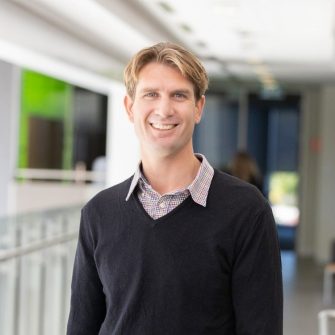
Aidan Cashin
Aidan Cashin
BExPhys 2013 PhD 2021
NHMRC Emerging Leadership Fellow (Neuroscience Research Australia) and Conjoint Senior Lecturer (UNSW Sydney)
A bit about me...
I am a NHMRC Emerging Leadership Fellow, Conjoint Senior Lecturer, and accredited exercise physiologist passionate about improving the evidence-based care for people with chronic pain.
I completed my undergraduate training at UNSW in exercise physiology following my interest in medicine, health and physical activity. Enthused with the skills my undergraduate training had equipped me with, I worked clinically for three years helping people with chronic and complex health conditions move forward with their recovery and get back to the things they want and need to do. I became particularly interested in chronic pain and eager to better understand this complex and common experience.
Although I loved my clinical work, it was increasingly apparent that there were important gaps in the evidence-base which needed to be addressed to help improve the care provided to people with pain. This led me to pursue a PhD through UNSW at Neuroscience Research Australia (NeuRA) where I investigated evidence-based treatments for low back pain with a particular interest in better understanding how treatments work.
My PhD training at UNSW and NeuRA was an invaluable experience which has helped me pursue a full-time career in research. I am currently supported by an Australian Government Fellowship to continue my research on chronic pain management with a particular focus on tailoring the implementation of evidence to forgotten populations in chronic disease management.
When I’m not working, I can be found at the beach playing with my son or surfing.
Quick fire Q&A
1. Do you have a favourite quote or mantra?
“You're off to Great Places!
Today is your day!
Your mountain is waiting,
So... get on your way!”
2. What are you reading/listening to?
I’m currently swapping between non-fiction and fiction books depending on my mood; reading Liam Mannix’s “Back Up” which describes the global problem of back pain and Trent Dolton’s “Lola in the mirror” for some fiction fun.
3. What advice would you give a student approaching the end of their degree?
I would encourage students to remain open to new possibilities and to different ways of doing things. Sometimes we can approach the end of our degree with a fixed view of what we want to do next or how things should be done as taught during our degree. I think it is important to be mindful of this and ensure we remain open.
4. How do you remain resilient in your line of work?
Remaining resilient is critical when pursuing a full-time research career. There are many challenges and setbacks (for example manuscript and grant rejections) that you need to deal with on a regular basis. For me, remaining resilient is centered around three things; perspective (keeping the bigger picture in mind for why you are doing what you are doing), family (keeping connected to family and being open to discuss challenges faced) and surfing (having a space to separate work and enjoy a hobby/passion).
5. What recent habit(s) has improved or changed your life?
One recent habit that has improved my work life has been to know when to ignore or not check emails. The constant influx of emails can be distracting and take away the needed focus to complete tasks efficiently. Now if I have a considered task to complete, whether it be writing or reviewing a student’s research, I will start the day completing the task and then check emails with a coffee during morning tea or later in the afternoon.
6. How did your time at UNSW help shape who you are today?
UNSW has been a key feature of my early adult life having spent almost 8 years at UNSW completing my undergraduate and postgraduate degrees. This time at UNSW has been instrumental in shaping who I am today both from an academic perspective but also from a personal perspective. Two things which have really stood out from my time at UNSW have been the development of my critical enquiry skills and the drive to improve my knowledge and self for the greater good.
7. What was your most memorable experience from your time at UNSW?
There are too many memorable experiences that I took away from my time at UNSW to list. I have formed lifelong friendships and have been presented with incredible experiences and opportunities throughout my time at UNSW.
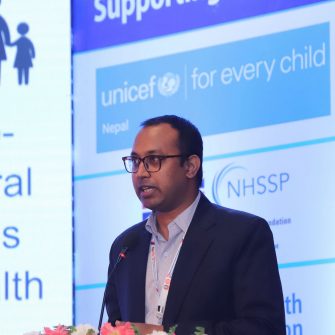
Ajit Kumar Karna
MPH 2012 MIPH 2012
Immunization Officer, WHO – Nepal
A bit about me...
I am a veterinarian, a public health scientist and a microbiologist with an excellent blend of entomology and epidemiology. My research interest is on one health, global health, health systems strengthening, and health security.
I hold veterinary medical degree (2004-2009) from Tribhuvan University, Nepal and Master in Public Health and International Public Health (2011-2012) from University of New South Wales, Australia. I have obtained PhD in Microbiology (2012-2017, focus on: virology, epidemiology, and entomology) from Colorado State University, USA.
I am currently an Immunization Officer with World Health Organization – Nepal. Most recently I was leading health emergency response component in USAID’s Strengthening Systems for Better Health Activity in Nepal. Before that, I was a microbiologist in Department of State Health Services, Texas, until the end of 2019. Before moving to Austin, I completed postdoctoral training on virus evolution and vector control in New Mexico State University, USA in 2018. At the same time, I was an adjunct professor of epidemiology position in New Mexico State University. I was involved with Center for Health and Disease Studies – Nepal since 2017 as a scientific member.
I was the recipient of the Australian Government Endeavour Award 2011, Australian Government Development Scholarship 2011, and USAID’s Livestock-Climate Change Collaborative Support Program Award 2012. I have authored and co-authored number of peer reviewed research papers on infectious diseases.
Quick fire Q&A
1. Do you have a favourite quote or mantra?
Honesty and hard work pay sooner or later!
2. What are you reading/listening to?
Reading books on entrepreneurship; and listening to classic Nepali and Hindi songs.
3. What advice would you give a student approaching the end of their degree?
Start networking and at the same time work on application materials.
4. How do you remain resilient in your line of work?
By doing mindfulness exercise, or hiking and travelling to new places.
5. What recent habit(s) has improved or changed your life?
Travelling to new places, especially rural areas.
6. How did your time at UNSW help shape who you are today?
I took challenging yet interesting courses, mentored by excellent faculty members, which helped me what I am today in the field of infectious diseases.
7. What was your most memorable experience from your time at UNSW?
Knowing people from across the world!
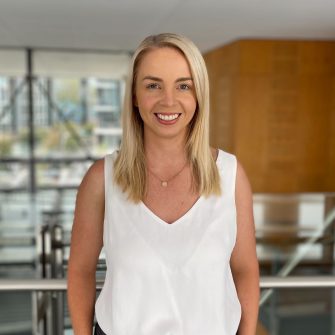
Alicia Brown
Alicia Brown
BExPhys 2016, MPH 2022
Project Manager and Research Assistant with Neuroscience Research Australia
A bit about me...
I’m Alicia, a researcher with Neuroscience Research Australia (NeuRA), exercise instructor and semi-new mother to my infant son, Flynn.
I have always had a keen interest in health, medicine, and particularly physical activity, which led me to a Bachelor of Exercise Physiology with UNSW, graduating in 2016. I started with NeuRA in 2018 joining the Falls, Balance, and Injury Research Centre, designing, trialling, and implementing fall prevention strategies. Working for NeuRA further ignited my passion for population health and health advocacy, prompting me to undertake postgraduate education, completing a Master of Public Health with UNSW, graduating in 2022.
The focus of my current role is redeveloping a digital fall prevention solution, providing evidence-based, tailored, and progressive exercise programs to older adults, delivered through mobile technology. Through this role, I have been fortunate to work with industry experts and many enthusiastic research participants, gaining their insights into healthy ageing and applying these learnings when designing new programs.
Putting my research into practice, I also instruct a group-based strength and balance exercise class for older adults.
In my personal life, I enjoy spending time with my family, recently bringing our young son into this world has been life’s biggest joy. Me time includes going to the gym, playing soccer (my favourite!) and trivia nights. My husband and I have recently attained our scuba-diving certification and look forward to more of this.
Quick fire Q&A
1. Do you have a favourite quote or mantra?
“Life is what you make it”. The biggest forces are not always, but often intrinsic.
2. What are you reading/listening to?
I’m currently reading “Happy Place” by Emily Henry as part of a book club, although, I have some catching up to do! I’m often listening to “The Imperfects” podcast and my favourite song, at the moment, is “Jungle” by Fred Again.
3. What advice would you give a student approaching the end of their degree?
The end of your degree can be a stressful but exciting time. Take steps that are going to set you up for your soon to be new beginnings; reach out to lecturers or industry role models about opportunities or career plans, by networking and attending events related to your area of interest you will most definitely learn more about what you might like to do and how you might get there. However, at the risk of sounding cheesy, be sure to stop and smell the roses; university is a particularly special time in your life, and you have achieved so much. Enjoy time with your peers, the food court lunch, library sessions and one last journey up the Basser Steps.
4. How do you remain resilient in your line of work?
Early on in my career it became clear to me that stress management and EQ are pivotal in maintaining a healthy work life. Working with integrity and empathy with our clients and often reaching out to colleagues helps me feel grounded in my work. Maintaining a work-life balance is also important, making time for family, friends, exercise, and sport/leisure.
5. What recent habit(s) has improved or changed your life?
Running! I have recently started running again and the post-run endorphins really set you up for a good day.
6. How did your time at UNSW help shape who you are today?
UNSW has been part of my journey into adulthood having attended since the age of 17 across two degrees. My time at UNSW has fostered both academic and personal growth as I learned how to learn and discovered my interests/passions and strengths/weaknesses throughout this time. Some of my greatest friendships have come from people I met at UNSW.
7. What was your most memorable experience from your time at UNSW?
Whiteboard group sessions in the library rehashing subjects like anatomy and biochemistry. Studying was made fun getting together with your peers and some coloured markers going over “very fun” topics like the TCA cycle or muscles of the hand. I will also never forget receiving the final results of my undergraduate degree, knowing it was all coming to end and visiting the library lawn to reflect and soak it all in.
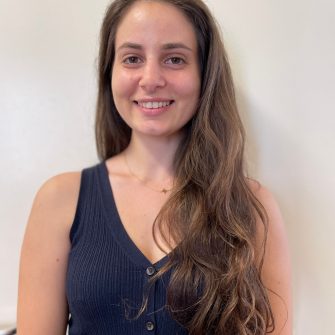
Anita Dimovski
Anita Dimovski
BExPhys 2017
Priorities Project Officer, Sutherland Hospital – Sydney, Australia
A bit about me...
I’m currently working as a Project Officer with Sutherland Hospital and an Exercise Physiologist by background.
Growing up I have always been involved in dance and gymnastics, receiving a scholarship in 2012 to the Joffrey Ballet School in New York City. However, I decided to take a different path in life and enrolled into the Bachelor of Exercise Physiology. In 2016 I joined Sutherland Hospital as an Allied Health Assistant and transitioned to an Exercise Physiologist post-graduation in 2017, specialising in Heart Failure, Respiratory, and Aged Care.
During this time, I found an opportunity to blend my passion for dance and falls prevention and developed the Steady Steps: Moving Towards Better Balance™ Program, a dance falls prevention program for older adults. My program not only won the People as Partners category at the 2018 SESLHD Improvement and Innovation awards but also ignited my passion for project management.
In my current role, I have the opportunity to lead and support Sutherland Hospital priority projects. This role bridges my clinical expertise with my passion in project management, allowing me to collaborate with exceptional colleagues to enhance patient care and patient experience.
Outside work, I love spending time with my family and friends. Going on holidays and watching my son experience the world is one of my favorite things. Me time, I enjoy Pilates and an occasional dance class.
Quick fire Q&A
1. Do you have a favourite quote or mantra?
“Everything happens for a reason.”
2. What are you reading/listening to?
I plan to start reading the Bridgerton Series.
3. What advice would you give a student approaching the end of their degree?
If you haven't already, start networking to explore potential job opportunities. Putting yourself out there through work experiences or shadowing professionals in your field is great for your resume and can prepare you for future job applications. Be proactive so you can grab opportunities as they arise.
4. How do you remain resilient in your line of work?
Throughout my career, utilising reflective practices has helped me remain resilient. Developing my self-awareness and staying true to my values.
5. What recent habit(s) has improved or changed your life?
After having my son, I joined my local reformer Pilates studio which has really helped me build my strength and endurance.
6. How did your time at UNSW help shape who you are today?
The passion my lectures and tutors spoke with when teaching, really inspired me as a young adult. It's a reminder that when passion fuels your career, every day feels less like work and more like a rewarding journey.
7. What was your most memorable experience from your time at UNSW?
Receiving the School of Medical Sciences Practicum Prize in Exercise Physiology.

Ashik Asafali
Ashik Asafali
PhD 2017
Senior Editor at The Biomedical & Life Sciences Collection, Henry Stewart Talks Ltd – London, UK
A bit about me...
I am a Physician with a master's in medical biotechnology and PhD in Vision Sciences. I am an accomplished biomedical research scientist and teacher with a strong background in Biophysics, Medical Statistics and Ophthalmology. I have a rich experience in leading and managing pre-clinical and clinical R&D projects aimed at evaluation of risk factors, identification of novel therapeutic strategies and understanding physiological and pathological changes. My work has received research grants from NIH USA, VisionCRC Sydney, CSIC Madrid, and DBT India. My research productivity has been excellent with 140+ publications, a book chapter on the mechanobiology of the human eye and 1100+ citations, and I have served as a Reviewer for reputed journals in ophthalmology.
In 2018, I was the recipient of the prestigious UNSW Young Alumni Award and my portrait (one among the 14 alumni worldwide) was featured in the UNSW Science Facing Equality project. I was elected Member of the National Academy of Medical Sciences (India) in recognition of significant contribution for the advancement of Medical Sciences. I am an active member of the Association for Research in Vision and Ophthalmology (ARVO) and appointed to serve ARVO’s Global Members Committee and Publications Committee. I have been selected as a mentor for the ARVO's Women's Leadership Development Program, Global Mentorship Program and Developing Country Eye Researcher Travel Fellowship program. Currently, I serve as the Senior Editor of The Biomedical & Life Sciences Collection, Henry Stewart Talks providing high quality online lectures ideal for teaching/research within both academia and pharma.
Quick fire Q&A
1. Do you have a favourite quote or mantra?
The woods are lovely, dark and deep, but I have promises to keep, and miles to go before I sleep.
2. What are you reading/listening to?
Reading the newspaper and science magazines; listening to Kollywood songs.
3. What advice would you give a student approaching the end of their degree?
It is okay to take risks and face new challenges than walking the traditional path. Sometimes growth requires new company, new locations and new mindsets.
4. How do you remain resilient in your line of work?
Forget the mistake; remember the lesson. It is the darkest nights that produce the brightest stars!
5. How did your time at UNSW help shape who you are today?
Everything gives certain experiences and my time at UNSW provided me some unique ones. Apart from higher education and training in research, I was able to gain employable skills such as commercial acumen, conflict resolution, knowledge of current industry needs, leadership skills, problem solving, project management, resource management, time management and outstanding soft skills allowing for the development and maintenance of professional relationships with key opinion leaders.
6. What was your most memorable experience from your time at UNSW?
Receiving the 2018 UNSW Alumni Award (Category: Young Alumni) at the Roundhouse.
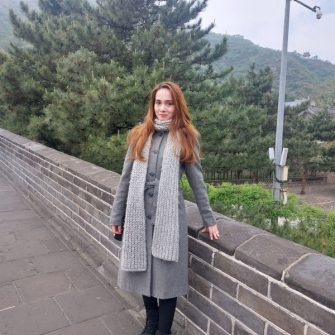
Atika Azura Rashed
Atika Azura Rashed
MPH 2023 MHLM 2023
Deputy Medical Director, Women & Children Hospital – Kuala Lumpur, Malaysia
A bit about me...
I am a trained medical doctor with several years of clinical experience in General Medicine upon graduation. Subsequently, I ventured into healthcare management whereby I also had the opportunity of working in various sectors at the Health State Department and the Ministry of Health Malaysia for almost 5 years. Throughout that period, I was also actively practicing at private hospitals and GPs.
The prospects of career advancement and the yearning for knowledge had led me to browse for a course that would fulfill these desires. I found that UNSW Sydney offered me the chance to complete a dual Masters degree program which is not available at other universities. I decided to pursue a Master of Public Health because I needed a program that would allow me to address public health challenges in a practical setting, whereas I felt that a Master of Health Leadership & Management would better equip me with the necessary skills required in a leadership role in healthcare.
I received paid leave from the Ministry of Health and obtained a local sponsorship which covered my tuition fees and living expenses in Australia. I graduated in 2023 and am currently working as the Deputy Medical Director of a public hospital in Kuala Lumpur, Malaysia. In my free time, I enjoy collecting antiques and vintage collectables.
Quick fire Q&A
1. Do you have a favourite quote or mantra?
“No one can construct for you the bridge upon which precisely you must cross the stream of life, no one but you yourself alone.” - Friedrich Nietzsche -
2. What are you reading/listening to?
I listen to a wide array of music including Jazz, Rock and 80’s and 90’s Pop. I enjoy reading both fiction and non-fiction books. I’m currently reading “Surrounded by Idiots” by Thomas Erikson, which is a book aimed at helping to understand how people function.
3. What advice would you give a student approaching the end of their degree?
Enjoy the journey and do not allow yourself to regret not grabbing on to any great opportunities that may come your way.
4. How do you remain resilient in your line of work?
I am motivated by the accomplishments of my seniors and those that I look up to, hence I strive to walk a similar path of success as them.
5. What recent habit(s) has improved or changed your life?
Having a positive attitude and that in retrospect, the obstacles that I am facing now are not as daunting as what I have believed them to be.
6. How did your time at UNSW help shape who you are today?
My time at UNSW was such a memorable experience as I was able to learn to interact and communicate effectively with a diverse group of people from different backgrounds. I did not only take home a scroll, but a lifetime of memories and life skills that can only be developed through my time at UNSW.
7. What was your most memorable experience from your time at UNSW?
Walking around the campus grounds and reading at the library are some of my fondest memories.
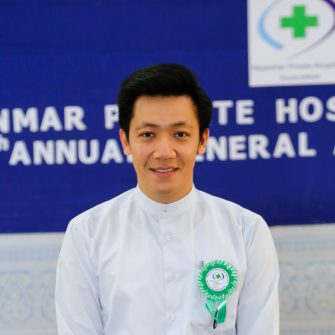
Aung Pyae Kyaw
Aung Pyae Kyaw
MHM 2012
Executive Director at Asia Royal Hospital – Yangon, Myanmar
A bit about me...
Born and raised in Yangon, Myanmar. I’m a trained medical doctor and went to work in a hospital management setting after graduation. After a couple of years, I was browsing universities for further training in healthcare management and UNSW came to my attention for its strong reputation. As an Asian, Australia caught my eye for its rich cultural diversity. I took a break from the workplace to join the master program at UNSW. After my graduation in 2012, I went back to my country and now reside in Yangon.
I am currently working as an Executive Director at the Asia Royal Hospital (one of the pioneer private hospitals in Yangon). I am also working as a Central Executive Member as well as Treasurer of the Myanmar Private Hospital Association (it is an NGO which unites and helps private healthcare hospitals throughout Myanmar). My hobbies are networking, reading, swimming and of course, music.
Quick fire Q&A
1. Do you have a favourite quote or mantra?
“The future depends on what you do today.” by Mahatma Gandhi
2. What are you reading/listening to?
I am into history, as I believe we can learn a lot from it. I am into novels and music - 80s & 90s music as well as instrumental.
3. What advice would you give a student approaching the end of their degree?
Before the end of a degree, please take time in choosing your career or profession as you will walk this path in life for a long time. As every profession has good as well as bad points; I would suggest considering these before starting a new role.
4. How do you remain resilient in your line of work?
I always look up to successful individuals in my career - it drives motivation. Meditation and setting life goals, in terms of my career and education, helps strengthen my resilience.
5. What recent habit(s) has improved or changed your life?
Watching motivational YouTube channels and joining a gym has improved my physical fitness and mental wellbeing.
6. How did your time at UNSW help shape who you are today?
Learning how to communicate and learn with a diverse group of individuals has shown me how my career is not limited to a degree only.
7. What was your most memorable experience from your time at UNSW?
Gatherings after classes and Sydney beaches will always be a fond memory.
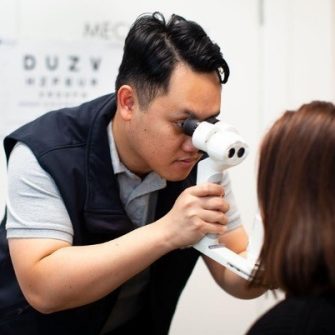
Austin Tang
Austin Tang
BSc 2017 MClinOptom 2019 GradCert 2021
Staff Optometrist at the Australian College of Optometry – Melbourne, Australia
A bit about me...
My name is Austin Tang and I currently work as an Optometrist at the Australian College of Optometry, which is a tertiary institution and public health optometry service. Born and raised in Sydney, I graduated from UNSW in 2018 completing my Master’s Degree in Clinical Optometry. My first two years of practice were in regional NSW, in Broken Hill and Dubbo, where optometrists play a crucial role in eyecare services due to limited access to specialist care. I gained vast experience in managing challenging ocular presentations and also got to experience the slower pace of the country lifestyle. I was able to reconnect with my childhood hobbies once moving to the country, those being art and tennis. I also enjoy traveling and eating nice food!
Part of my current and previous roles have included providing services in various settings, such as in nursing homes, Aboriginal Medical Services, correctional services, support residential services, homeless shelters and also regional optometry services through Brien Holden Foundation and Royal Flying Doctor Service. These unique opportunities have given me a greater appreciation for the work that I do as an optometrist.
Quick fire Q&A
1. Do you have a favourite quote or mantra?
One that has stood out to me is: “Two things define you: Your patience when you have nothing and your attitude when you have everything.”
2. What are you reading/listening to?
I enjoy listening to Podcasts, especially when I am going for long drives for work. Some of my favourite ones recently include Jay Shetty and Art of Manliness. I haven’t read any books recently, but one of my favourites is When Breath Becomes Air by Paul Kalanithi.
3. What advice would you give a student approaching the end of their degree?
Be open minded and take up opportunities that may be the less conventional or safe pathway, whether these be before graduation or even in your early years post graduation. An opportunity to go to India for my final year preceptorship exposed me to the most interesting eye cases and being able to experience eyecare in a completely different setting to what we have in Australia, and this led me to choosing to relocate regionally to start my career as an optometrist.
4. How do you remain resilient in your line of work?
This can be difficult in a challenging line of work, whereby many of the clientele attending the Australian College of Optometry come from vulnerable and disadvantaged backgrounds. The presentations can be more clinically challenging and communication can be difficult with some patients whereby English is not their first language. However, providing services to these individuals is more rewarding. It is even more rewarding to do outreach work and delivery services to rural areas. I also find the opportunity to develop professionally and to develop clinical skills are ways to remain resilient.
5. What recent habit(s) has improved or changed your life?
I recently moved into an apartment complex with a pool and gym, so I have been more consistent in doing physical activity especially after a long day of work. There are no more excuses that the gym is too far!
6. How did your time at UNSW help shape who you are today?
I was grateful for the various extra-curricular activities that I participated in, which helped me develop my interpersonal and communication skills. Many of these activities were voluntary and this was rewarding because I knew I was putting my time into making a difference to other students’ experience whilst also bonding with like-minded individuals.
7. What was your most memorable experience from your time at UNSW?
My favourite experience was being given the opportunity to work at Arc as a Program Coordinator, co-ordinating the Global Village program in 2016-2017. Having participated in one of the 2015 trips to Laos, I was grateful to be given the opportunity to use this experience to recruit and mentor like minded volunteers, coordinate trip logistics and provide cultural awareness training.
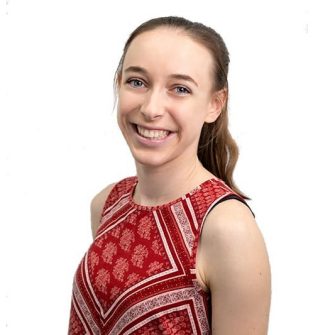
Bethany Halmy
Bethany Halmy
BExPhys 2018
Exercise Physiologist at Royal Rehab LifeWorks – Sydney, Australia
A bit about me...
Hi, I’m Bethany! I am currently an Accredited Exercise Physiologist (AEP) at Royal Rehab LifeWorks.
My path in this field began when I embarked on my Bachelor of Exercise Physiology at UNSW in 2014. At that time, I didn't have a clear career direction; I simply knew that I had a passion for sport and exercise, and a fascination with the science of the human body. Throughout the degree and following the conclusion of my university placements, I discovered that I particularly enjoyed making a positive difference in the lives of those with illnesses and disabilities, particularly in a rehabilitation setting.
After graduating and improving my skills and confidence in some community roles, I was able to obtain a role as lead AEP in a rehabilitation hospital, working with a diverse range of patients with chronic conditions and disabilities, as well as those recovering from surgery. Additionally, I had the opportunity to dive into the world of research as a research assistant at NeuRA. During this time, I focused on investigating falls and balance in older adults and individuals with neurological conditions. I even became a published research author which was pretty exciting!
Recently, I embarked on a new role at Royal Rehab LifeWorks, where I am proudly the first Exercise Physiologist on the team. In this capacity, I'm enthusiastic about defining the role our profession plays in this innovative setting, where we leverage advanced technology to enhance the lives of individuals with complex disabilities and neurological conditions.
Outside of work, you’ll most likely find me running as I enjoy competing in athletics. I also love spending time with friends, watching tennis (even though I have zero coordination to play myself!), discovering and eating over-the-top desserts (I have a massive sweet tooth) and traveling whenever I can.
Quick fire Q&A
1. Do you have a favourite quote or mantra?
"Opportunities don't happen. You create them." - Chris Grosser
2. What are you reading/listening to?
I just finished reading “The Girl Who Fell From the Sky” by Emma Carey. Her positivity and self-drive is absolutely amazing and it has provided me a great insight into the patient perspective in my line of work.
3. What advice would you give a student approaching the end of their degree?
Say yes to opportunities. Every single little role, job, connection or experience adds up and can help you achieve the bigger goal or dream.
Also, being an Exercise Physiologist is a great because there is so much room to expand our profession in the allied health world. Be brave and confident to push boundaries and create initiatives to show what we can do.
4. How do you remain resilient in your line of work?
I genuinely love what I do and am constantly motivated by the positive stories and achievements that I help my clients attain. I enjoy being challenged, putting my hand up for opportunities and continually researching and seeking ways to learn and become better at what I do. On days that don’t quite go to plan, I ensure that I have a great network of people to confide in and have support from such as my workmates, friends and family. Running is also an outlet for me to enjoy and clear my mind.
5. What recent habit(s) has improved or changed your life?
Drinking water! My new year’s resolution this year was to make an effort to drink more water and I am happy to say that I’ve succeeded in making it a habit and my body is very thankful for it.
6. How did your time at UNSW help shape who you are today?
Some of my closest friends are those who I met over my time at UNSW – in classrooms, societies, at uni games and other random social events (where free food was usually involved). Maintaining these connections with people who have similar interests is something I definitely cherish.
In hindsight, I can't help but reflect on the skills I developed when faced with the dreaded 'randomly assigned' group assignments. Although they felt like the bane of my existence at the time, collaborating with a diverse mix of classmates significantly enhanced my teamwork, communication, and leadership abilities. These skills have since proven to be exceptionally valuable in the workplace, where we don't always have the luxury of handpicking our colleagues!
7. What was your most memorable experience from your time at UNSW?
All the extracurricular activities on offer outside of the classroom at UNSW are what will always be most memorable for me. From playing bubble soccer on the oval, having an absolute blast participating in uni games, finding out which society was hosting a free BBQ lunch on campus each day, midday drinks and hot chips at the Whitehouse, and most importantly the fun we all had at the ExPhys end-of-year ball every year!
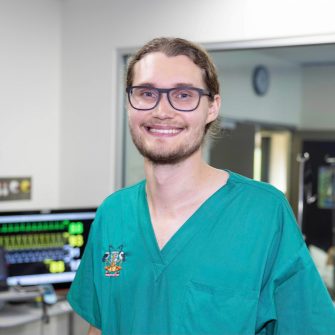
Ben Jones
Ben Jones
GradDipHM 2020 BMed 2021 MD 2021 MHLM 2023
Junior doctor at Royal Darwin Hospital & PhD student at the University of Oxford
A bit about me...
I studied medicine at UNSW from 2016-2021 alongside a Masters of Health Leadership and Management which I then finished in 2023. I am currently completing my medical internship at Royal Darwin Hospital in the Northern Territory which I have found to be an incredible place to live and begin practicing as a doctor. It’s the sort of place that can enhance not only clinical reasoning, but also wrap-around social care skills, and understanding of health systems.
Before this, I spent the two years after I graduated from UNSW in the UK where I have been studying my PhD at the University of Oxford supported by a Rhodes Scholarship. My PhD topic is rheumatic heart disease (RHD) – a childhood heart condition with a protracted, painful treatment course that is sadly still common in some remote Australian communities despite being eliminated from most of Australia in the 1950s. One of the challenges with RHD is that is it difficult to detect until people are in heart failure in the late stages of disease. My work focusses on the implementation of a program training remote Aboriginal Health Workers to use handheld echocardiography to detect RHD earlier and on Country so that treatment can begin sooner. I have been fortunate enough to spend time in several remote communities across the Top End and Pilbara regions as part of this work. As much as I have loved this year in Darwin, I am also looking forward to returning to Oxford to complete my doctoral studies.
Quick fire Q&A
1. Do you have a favourite quote or mantra?
I reflect often on something that an elder said to me a few years ago. He said, “forget everything you have been taught, and remember everything you have learnt.” They feel like wise words in times like these.
2. What are you reading/listening to?
‘Cutting for Stone’ by Abraham Verghese. A master of words and the human elements of medicine. I would highly recommend this book to any healthcare professional.
3. What advice would you give a student approaching the end of their degree?
I think any words of advice I could offer here I will need to heed as I approach the end of my current degree too! I would say that staying present and enjoying that period of life for what it is feels more important than ever as you approach the end of any journey.
4. How do you remain resilient in your line of work?
For me, the most important aspect has always been building and maintaining a strong support network.
5. What recent habit(s) has improved or changed your life?
Going to the buzzing Darwin weekend markets and doing the newspaper quizzes with friends.
6. How did your time at UNSW help shape who you are today?
My time at UNSW has shaped me in too many ways probably to even recognise. However, I do know that the people I met across Wallace Wurth, Nura Gili, Baxter College, Arc, and the university more broadly have had a profound impact on who I am today.
7. What was your most memorable experience from your time at UNSW?
After four years of living on campus, coupled with classroom time and a range of extracurricular activities, I don’t think I can pinpoint a single most memorable experience. However, one standout aspect of my experience at UNSW is the sense of community I found. Whether it was in Nura Gili Winter Schools, the college dining hall, or anatomy tutorials, each facet of the experience which UNSW offered contributed to a rich and fulfilling ç life for which I will always be grateful. The connections I made and the experiences I shared with fellow students and staff members have left a lasting impact on both my professional and personal self.
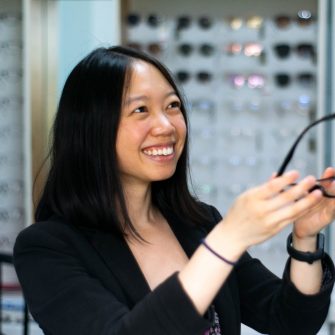
Carina Trinh
Carina Trinh
BSc 2012 BOptom 2012
Principal Optometrist and Owner of Carina Eye Care – Sydney, Australia
A bit about me...
Hello, my name is Carina Trinh and I’m proud to be an optometrist and one-woman-practice-owner of @carinaeyecare. Since my final year at UNSW in 2011, I’ve worked as a fully qualified optometrist for almost a decade through different settings. I absolutely loved my early years spent in Dubbo, surrounded by rural communities and Indigenous clinics where I was involved in complex disease management. This was followed by adventures working in Indigenous communities in the Top End of the Northern Territory, and volunteering in the breath taking Himalayas for the Nepalese Sherpa community.
One night, I noticed some flashes in my vision and realised that there may be something very serious going wrong with my eye. This first-hand experience of almost going blind at age 24 as a complication from being myopic (short-sighted) shocked my system and sent me back to Sydney on a mission to prevent this eye condition in others. Metro life initially took me by surprise with the fast pace and the sheer amount of myopia but allowed me to home in on my contact lens and myopia management skills.
These experiences have shaped my strong view of how I want to give back to my community through eye care. Thankfully, I’ve shaped my career in a way that enables me to put patients first without the usual retail pressure that many optometrists are faced with. The flexibility of owning my own practice also allows me to continually develop my skills and knowledge by working with other passionate and leading optometrists.
Quick fire Q&A
1. Do you have a favourite quote or mantra?
“Do what feels right for you.” Past uni-Carina probably would have been very frustrated by this, but much personal development over the years has taught me to at least attempt to listen to myself and my intuition beneath all the external factors and emotions.
2. What are you reading/listening to?
I’m currently reading “How to talk so kids will listen, and listen so kids will talk” which is a book recommended by my friend to further develop my communication skills with vision therapy for children. Funnily enough, it’s been very helpful for navigating my own personal relationships too.
3. What advice would you give a student approaching the end of their degree?
Really think about where you want to go with your career, reach out to those who you admire, and don’t be afraid to ask for advice on how you can follow in their footsteps.
4. How do you remain resilient in your line of work?
If you haven’t already, develop an empowered mindset. I definitely did not have this during uni, but it’s been at the forefront of my mind since graduation. I’ve found that being humble in knowing that there is always more to learn and something to learn from every colleague and patient has been helpful. If every situation is embraced as a learning experience, there will always be benefit and growth. Also, keeping in mind that we always have some control over our feelings, actions, and direction in life will help prevent us from feeling helpless and stuck.
5. What recent habit(s) has improved or changed your life?
Going to morning exercise workouts. This is actually not new, as I’ve been doing morning exercise on and off since high school. However, I’ve only recently discovered how incredibly powerful it is for me to do something “productive” in the morning such as exercise or housework. It completely kick starts my day into a good day.
6. How did your time at UNSW help shape who you are today?
My time at UNSW was possibly the most difficult time I’ve ever had in my life. Paradoxically, it was also one of the most fun and exciting times of my life. Studying was nowhere near as clear cut as it was back in high school, but UNSW was a breeding ground for amazing friendships, and broadening my horizons in meeting students from all walks of life. My involvement in the Student Optometry Society allowed me to branch out to numerous societies across campus, Yellow Shirts allowed me to get to know people I would never have met otherwise, and my Optometry Preceptorship Placements allowed me to meet mentors who really instilled in me that “No one is better than anyone else, we’re all the same,” a valuable reminder that there is value and worth in every person.
7. What was your most memorable experience from your time at UNSW?
Organising and enjoying the first Student Optometry Society Camp (possibly in decades), to strengthen the bonds and collegiality between students. This was my solution to relieving some of the unnecessary mental struggles that were experienced in my cohort. My goal was to prevent unnecessary depression and anxiety for the younger cohorts by developing strong social connection and support both within and across cohorts.
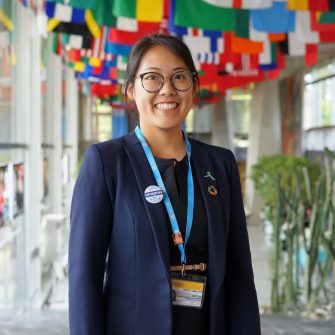
Caroline Lee
Caroline Lee
BMed 2019 MD 2019 BSc (Med) Hons 2019
Infectious Diseases Advanced Trainee, volunteer at Doctors for the Environment & Hepatitis B Free
A bit about me...
I am an Infectious Diseases registrar, global health nerd, volunteer, aspiring writer. I juggle many interests and always love a laugh. During my study at UNSW, I enjoyed being a part of various student groups and learning about global health and advocacy. Some of my most notable experiences were with the Medical Students Aid Project and AMSA Global Health. Being able to connect with like-minded students fostered a strong foundation to pursue social justice causes and explore how we can make a difference no matter how big or small. Having volunteered in Papua New Guinea with Hepatitis B Free, I couldn’t shake away the sense of injustice of severe health disparities depending on which part of the world one lives in.
My last two years of university were spent in the beautiful mid north coast of NSW at Coffs Harbour Rural Clinical School, giving me a taste of regional medicine. After graduating, I started an internship in 2020 at a busy hospital in Western Sydney, in the midst of the COVID-19 pandemic. These experiences deeply entrenched the importance of doctors to address the health needs of the public. It also highlighted the impacts of work on mental health in medicine, including burn out and workforce shortages.
Following this, I completed basic physician training and a Master in Public Health and Tropical Medicine at James Cook University. I always wanted to continue some kind of activity in global health and an MPH was a good way to develop foundational skills and knowledge. Currently, I am training in infectious diseases and finding new ways to make cheesy puns about infections.
I volunteer with Doctors for the Environment as Secretary for the sustainable healthcare committee and am learning from the incredible work being done by tireless advocates at DEA across the country. I still volunteer with Hepatitis B Free, most recently being involved in their hepatitis program in the Pacific Island nation Kiribati. Outside of work I enjoy spending time with loved ones, being in nature when I can, reading, and playing tennis (badly!).
Quick fire Q&A
1. Do you have a favourite quote or mantra?
"The idea that some lives matter less is the root of all that is wrong with the world" - Paul Farmer.
"Never underestimate the power of a small group of committed people to change the world. In fact, it is the only thing that ever has." - Margaret Mead
2. What are you reading/listening to?
Anam - Andre Dao
How to talk about climate change in a way that makes a difference – Rebecca Huntley.
3. What advice would you give a student approaching the end of their degree?
It sounds simple but look after your physical and mental health – whichever way works for you. Medicine is tough at times and it’s important to find ways to preserve one's humanity. Also, explore interests and foster an identity outside of medicine. Always be kind.
4. How do you remain resilient in your line of work?
Honestly this is something I continue to work on! First, recognize that we are only human, and it is natural to experience stress, sadness, grief and every other spectrum of emotion in the intense profession. Talk to friends and family, debrief tough situations with trusted colleagues, take time out to rest, consider seeking professional help. Support one another and lean on each other. I find it’s the little interactions that lift my spirits – a joke with friends, getting coffee with the team, or a heartwarming interaction with a patient – these little things can really bring a smile even on the hardest of days.
5. What recent habit(s) has improved or changed your life?
I quite like productivity apps but need something simple - a friend of mine introduced Notion to me last year which has worked well!
6. How did your time at UNSW help shape who you are today?
Many ways! On top of learning and research, the biggest impact of UNSW was being able to meet and develop connections with a variety of students from different backgrounds and life journeys and collaborate together on shared interests such as student volunteer groups. Being involved with groups like Medical Students Aid Project provided opportunities to learn about global health and meet like-minded people and empowered me to believe that young people can make a difference on social issues.
7. What was your most memorable experience from your time at UNSW?
The blur of hours and hours spent studying and hanging out at the Coffs Harbour Clinical School. Swims at the beach, campfires, and all the beautiful walks and places to explore in the surrounding region. The late nights in meeting rooms at UNSW Wallace Wurth with MSAP planning events and debating the role of medical students engaging on various health issues. But most of all, the friends I've made through these ups and downs, and getting to see where life has taken us since.
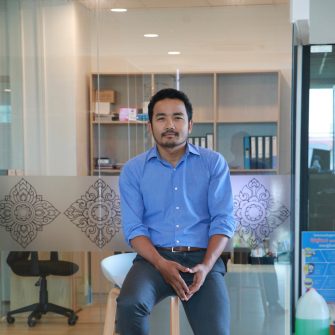
Chanchamnap Sok
Chanchamnap Sok
MPH 2017 MIPH 2017
Program Coordinator at ACCESS Program (The Australia-Cambodia Cooperation for Equitable Sustainable Services) managed by Cowater International – Cambodia
A bit about me...
Sour Sdey (Hello) from Cambodia, I am Chanchamnap Sok, a psychologist and public health professional focused on health system and policy reform. In 2015, I was awarded with an Australia Scholarship from the Australian Government and in 2018 I participated in the International Visitor Leadership Program managed by the US government to address the issue of access to health services for marginalised populations.
I have been working in the development sector since early 2000 tackling different aspects of health including, the HIV pandemic in Cambodia, malnutrition among children under five, maternal health and socio-economic and disability inclusion. I’ve contributed successfully to the decline of HIV in Cambodia in late 2000s and provided technical support to the Ministry of Health to develop a physical early detection tool for newborn and young children under five. This was endorsed by the Royal Government of Cambodia in 2019.
I am currently working to coordinate a bilateral program between the Australian Government and the Royal Government of Cambodia called “The Australia-Cambodia Cooperation for Equitable Sustainable Services – ACCESS Program” to improve physical rehabilitation services and strengthen the implementation of the National Disability Strategic Plan.
Quick fire Q&A
1. Do you have a favourite quote or mantra?
“What you are is what you have been. What you’ll be is what you do now” - Buddha
2. What are you reading/listening to?
I am reading two of my favourite books:
Factfulness: Ten reasons we're wrong about the world - and why things are better than you think by Anna Rosling Rönnlund, Hans Rosling, and Ola Rosling
Hit Refresh: A Memoir by Satya Nadella
3. What advice would you give a student approaching the end of their degree?
I would advise you to make most of your time enjoying the scenery of UNSW, in particular sitting in front of the main library in the evening.
Academically, I would advise keeping your friendships with pals from other countries, building a network of resources; and keeping connections with UNSW academic professionals.
4. How do you remain resilient in your line of work?
My strategy is to stay positive, optimistic, patient and be available.
Work-life balance is also my key strategy and on-going reflection.
Staying focused and prioritisingcontributes to my resilience at work.
5. What recent habit(s) has improved or changed your life?
Cycling and routine workouts improve my emotional and physical well-being.
6. How did your time at UNSW help shape who you are today?
My time at UNSW was a rewarding moment in life where I grew very independent in decision making, shaping my professional career focus and being accepting of differences.
7. What was your most memorable experience from your time at UNSW?
I love to look at the Sydney CBD from the top of UNSW library and walking downhill through the main entrance park during the evenings.
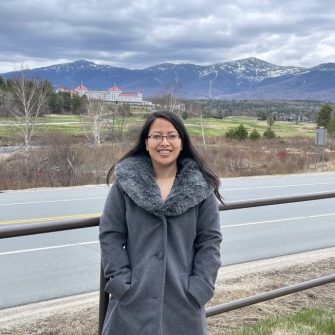
Chandni Joshi
Chandni Joshi
MHM 2012 MPH 2012
COVID-19 Epidemiologist – Boston, USA
A bit about me...
I started my career in global health as a data enumerator for the Burden of Disease project in rural Nepal. One day, a local mother told me that she was inspired to send her daughters to school because she saw me working independently in the village and earning money. This memory has been motivating me to work hard ever since.
I have garnered educational degrees from top ranked universities of Australia, U.S., and Nepal and global health experience working across three different continents- learning about the people, the culture, the education, and the health system. I have received a number of grants and awards, including full tuition and stipend support from the Tufts University (for Doctorate degree), Provost’s Fellowship at the Tufts University, full tuition and stipend support from the Australian Government (for master's degree), and full tuition support from Tribhuvan University (for bachelor's degree).
My research experience focuses on maternal health and improving healthcare access and quality for vulnerable populations, including people with low health literacy, refugees, Indigenous people, and people with substance use disorder. My multinational research experience is supplemented by my own experiences as a woman of colour, a migrant, and a mother. I possess a variety of key skills, including data management and analysis, quantitative and qualitative research, statistical and spatial analysis, programme planning, implementation, monitoring and evaluation, and systematic literature review.
At present, I am a COVID-19 Epidemiologist at Brookline Public Health and Human Services and a final year candidate of Doctor of Public Health at Tufts University, majoring in Biostatistics and Epidemiology. I was recently granted permanent residence status in Australia under the Global Talent visa. I plan to move to Australia sometime soon.
Quick fire Q&A
1. Do you have a favourite quote or mantra?
Struggle teaches us life lessons while success teaches us to be kind and compassionate.
2. What are you reading/listening to?
Sapiens: A Brief History of Humankind by Yuval Noah Harari
3. What advice would you give a student approaching the end of their degree?
Explore what skills the current job market needs and make sure you acquire those skills before you graduate. Learning is a life-long process, and it doesn’t stop when you graduate from university.
4. How do you remain resilient in your line of work?
I compartmentalise work and personal life. I am lucky to have a wonderful toddler who helps me avoid any thoughts (especially the bad ones) around my professional life when I am not working. I also share my experiences with my peers and ask about their experiences.
5. What recent habit(s) has improved or changed your life?
Taking time to identify my closest and most reliable network of family and friends with whom I can share my experiences and motivate each other.
6. How did your time at UNSW help shape who you are today?
Studying at UNSW was my first life experience as an independent adult. I had been living with my parents in Nepal until my early 20s (as expected by my culture). At UNSW, I got the opportunity to make friends from many different countries and cultures and to learn from professors with a vast array of experience and novel teaching techniques. When I was hired as a Research and Evaluation Officer at the Center for Primary Health Care and Equity, UNSW, I realised that my MPH degree at UNSW had taught me all the necessary skills required at work. My study and work experience at UNSW have been helping me ever since.
7. What was your most memorable experience from your time at UNSW?
I was pleasantly surprised by the huge and well-maintained beautiful buildings, the enormous library with access to all the books and journals from all over the world, students who were from so many countries and from different races and ethnicities, and the food court that served cuisines from different parts of the world. Honestly, I was amazed by everything I saw, since this was my first time outside my homeland.
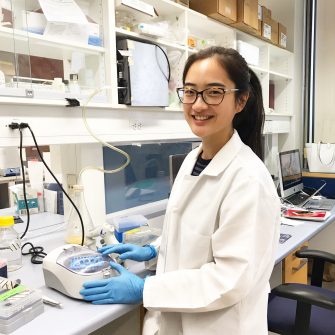
Daisy Shu
Daisy Shu
BSc 2012 BOptom 2012
Postdoctoral Research Fellow – Boston, USA
A bit about me...
I’m Daisy, a postdoc at Harvard Medical School studying the role of mitochondria and cellular metabolism in retinal eye diseases. I studied optometry and vision science at UNSW and since then, I’ve been obsessed with our eyes and the visual system.
After graduating, I worked as a clinical optometrist for two years before deciding to pursue a PhD in eye research. Many of the patients I saw in practice presented with cataracts, a clouding of the lens in our eyes and as such, I was eager to explore how cataracts form and their prevention. This became the foundation of my PhD thesis which I completed in the Lens Research Laboratory at the University of Sydney under the supervision of Professor Frank Lovicu.
After finishing my PhD, I hopped on a plane and made my way over to Boston, Massachusetts to start my postdoc at Harvard Medical School in the Saint-Geniez Lab where I am currently. Here, I study the mechanisms underlying age-related macular degeneration, another leading cause of blindness worldwide.
In addition to my love for science, I also love science communication and sharing my research findings and science career journey on social media (@EyeDaisyShu on Instagram and Twitter) as well as through a podcast which I co-host called “Behind our Science” (@BehindOurScience on Instagram) where we highlight the stories behind scientists and their exciting scientific discoveries.
Quick fire Q&A
1. Do you have a favourite quote or mantra?
“Where you stumble, there lies your treasure” - Joseph Campbell. Sometimes what you think is a hindrance, may actually be the best thing that ever happened to you.
2. What are you reading/listening to?
I’m currently reading a novel called “The Language of Flowers” by Vanessa Diffenbaugh. I recently got into gardening and this novel has really made me appreciate flowers even more, particularly the hidden messages behind different flowers.
3. What advice would you give a student approaching the end of their degree?
As much as the last few months of your degree can be quite stressful with deadlines left, right and centre, I would definitely have told my younger self to enjoy these final months a bit more. Take a moment to appreciate campus life, hang out with your uni friends on the library lawn, grab a coffee from the coffee cart and just chill for a bit.
4. How do you remain resilient in your line of work?
I tell myself to keep on keeping on.
5. What recent habit(s) has improved or changed your life?
Including a bit of physical exercise into my day most days of the week whether it be going for a jog along the Charles River esplanade or going for a swim at my local pool, it really helps clear my mind.
6. How did your time at UNSW help shape who you are today?
My time at UNSW had a huge impact on shaping who I am today and my love for vision science. In the School of Optometry & Vision Science at UNSW, I gained a strong appreciation for the eye and visual system from the intricate anatomy of my ocular tissues to how they all work together to enable us to see. During my optometry degree, I was fortunate to be awarded a UNSW Summer Vacation Research Scholarship which I did under the mentorship of Dr. Michele Madigan where I got my first taste of lab work. I got to put on gloves, examine ocular cells under the microscope and run experiments for the first time and I became hooked on research, the discovery of new unknowns about the eye and contributing to the scientific literature.
7. What was your most memorable experience from your time at UNSW?
My most memorable experience at UNSW would have to be O-Week. I love the atmosphere, checking out all the stalls, participating in fun events, signing up to cool societies and of course, the freebies.
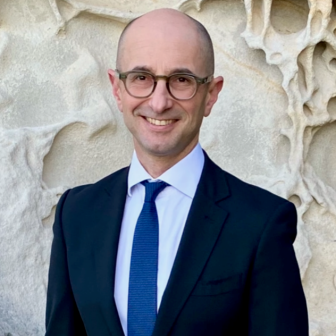
Daniel Tracton
Daniel Tracton
BOptom (Hons) 1996 MBA 2002 GradCertOcTher 2015
Founder/Owner Tracton Optometrists – Sydney, Australia
A bit about me...
I am currently the owner and principal optometrist of our own private optometry practice in Bondi Junction, Sydney. My wife Michelle (B.Environmental Science, Hons UNSW 1996) and I opened this practice in the middle of lockdown in 2021. We are the only community and family-owned independent optometry practice in the area and specialize in complex cases, children’s vision, myopia control, specialty contact lenses and we have a 1-hour lens laboratory on site. I completed an MBA at the Australian Graduate School of Management and spent several years in executive roles for Essilor Luxottica, the world’s largest optical business. We are the proud parents of two young adults. I enjoy travel, good food and wine, all types of music and studying foreign language in my spare time.
Quick fire Q&A
1. Do you have a favourite quote or mantra?
You have to have skin in the game.
2. What are you reading/listening to?
I absolutely love watching travel YouTube videos of vloggers travelling to unconventional locations. I really enjoy Bald and Bankrupt and Mark Wiens food adventures. I listen to a lot of Electronic Dance Music made in majestic locations, jazz and classical music concerts. I recently saw Australian jazz legend James Morrison in concert, and he and his band were just sensational. My passion is learning foreign language, so I use different media to improve my skills.
3. What advice would you give a student approaching the end of their degree?
Network, network, network. Find mentors and go from one coffee meeting to the next. Meet people from all walks of life and learn what they have experienced to work out what you would like to do. You might like their path so much that you want to emulate their trajectory.
4. How do you remain resilient in your line of work?
Living in Sydney is magic. I love swimming in the harbour beaches and walking on the foreshore walks along Sydney harbour. That keeps me fresh and focused for work. Professionally I enjoy conferences and I just returned from the Optometry Congress in Melbourne where I had a look at the latest and greatest technology to enhance our practice and deliver cutting edge eyecare to our patients.
5. What recent habit(s) has improved or changed your life?
Reconnecting with people who have had a big impact on my personal and professional life. It’s great to trade stories and have human interaction, especially after those crazy years of lockdown. I met many of these people on the UNSW library lawn! I have also upskilled on areas of subspecialty in optometry, such as myopia control, specialty contact lenses, orthokeratology, and ocular disease, which has really enriched my scope of practice and made work more satisfying.
6. How did your time at UNSW help shape who you are today?
I met some great people from different UNSW faculties and all walks of life. From law to psychology, engineering, commerce, medicine and arts. I still work with many of these fellow grads professionally, and I see them socially.
7. What was your most memorable experience from your time at UNSW?
I would have to say my professional training at the UNSW Optometry Clinic. We were able to see a wide array of patients from across New South Wales in the clinic and were able to look after their eyecare. Our lecturers and tutors came both from the academic space and private practice, so this gave us a great breadth of perspectives, from the latest in research to cutting edge private practice technology.
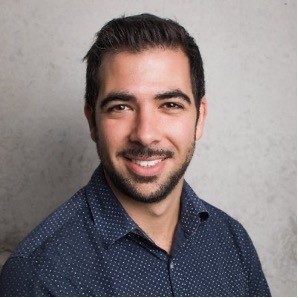
David Mizrahi
David Mizrahi
BExPhys 2011 MSc 2014 PhD 2019
Research Fellow (Daffodil Centre) and Lecturer, University of Sydney – Sydney, Australia
A bit about me...
I have always been interested in exercise, sport and helping people. When I started my first degree, I had no idea what I wanted to do in the world. As I went along, I forged my own path with the opportunities that came my way. I found that through my research in exercise, I can help children and adults affected by cancer to live better and healthier lives. Through this, I became really passionate about educating the wider community of the benefits of exercise, including patients, doctors, students and the general community, because I believe a more active community is a healthier and happier one.
I am a Research Fellow and a Lecturer in Exercise Physiology at The University of Sydney, and I use these roles as well as my Twitter profile (@DaveMiz_EP) to promote the use of exercise in cancer care. In 2022 I took my young family on a lifechanging 4 months abroad living in Memphis, USA, the home of blues music and BBQ ribs. I was based at St Jude’s Children’s Research Hospital on a Fulbright fellowship to research how exercise can be embedded into childhood cancer care.
Outside of work, I love exercise and sport (soccer, touch footy), playing the drums and camping.
Quick fire Q&A
1. Do you have a favourite quote or mantra?
“Some is better than none, more is better than less” – a quote I say to patients that something is better than nothing to get started in their physical activity journey.
2. What are you reading/listening to?
The subtle art of not giving a F**K (sorry for the swearing, you asked!)
3. What advice would you give a student approaching the end of their degree?
Your network will become one of your most valuable tools. Speak to people around you to see if they like their jobs, know of any opportunities or can give you some advice. Many of life’s opportunities come from within a network.
4. How do you remain resilient in your line of work?
I find that I need to maintain a healthy work-life balance. I try fit in exercise on most days, something in the gym, a quick run, or even just walk around the block to clear my head (blasting music to sing along to helps too!). Again, having the network of mentors and colleagues who become your friends is important to enjoy the highs and help you through the lows.
5. What recent habit(s) has improved or changed your life?
Getting back into exercise has helped me massively. The gym keeps me accountable, while having structured social sport gives me something to look forward to and a social benefit.
6. How did your time at UNSW help shape who you are today?
I owe most of my professional achievements to opportunities and connections made through UNSW, which gave me so much through my 3 degrees. I made great friendships over a decade which I will keep throughout my professional career.
7. What was your most memorable experience from your time at UNSW?
An amazingly fun group of friends in undergrad, graduating two research degrees (including the floppy PhD hat), and watching some students I taught grow and become really passionate in our field.
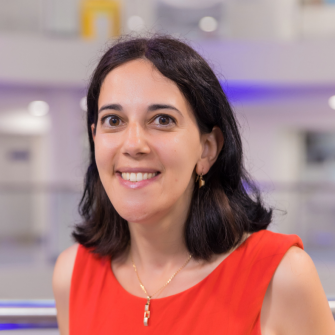
Deborah Burnett
Deborah Burnett
PhD 2019
Group leader at the Garvan Institute of Medical Research
Scientia Senior Lecturer at UNSW Medicine & Health
A bit about me...
I originally trained as a veterinarian working in small animal and emergency medicine in Australia and New Zealand. However, eventually I became frustrated trying to understand why different animals showed such different response to the same therapy, particularly in the context of autoimmune diseases. This led me away from veterinary medicine and into medical research. I undertook my honours at WEHI, under Prof Benjamin Kile and Prof Andreas Strasser investigating the genetic pathways which regulate blood clotting. In 2019, I completed a PhD at the Garvan Institute researching the role of antibodies in protective immune responses and autoimmunity, under the supervision of Prof Chris Goodnow and Prof Rob Brink. With the emergence of the COVID19 pandemic I pivoted my expertise to explore vaccination strategies to induce antibodies resistant to viral escape.
In 2023 I was fortunate enough to be awarded one of 4 Australian "Loreal-UNESCO For Women in Science" Fellows, and 2023 the Premier's Prize for Early Career Researcher of the Year (Biological Sciences).
From November 2024, I’m very excited to be starting a lab at UNSW Medicine & Health, developing novel pre-clinical models to explore antibody responses to challenging pathogenic threats, including infections associated with autoimmune diseases.
Quick fire Q&A
1. Do you have a favourite quote or mantra?
The most exciting phrase to hear in science, the one that heralds new discoveries, is not “Eureka!” (I found it!) but “That’s funny…”
2. What are you reading/listening to?
I’ve just discovered audiobooks on Spotify. Now the only problem is pacing myself, so I don’t use up my 13 hours a month all in one go!
3. What advice would you give a student approaching the end of their degree?
Life will take you down journeys you’ll never have predicted. When I embarked on, and even finished, my bachelor’s degree I would never even have imagined I’d have taken the course I’m currently on now. Remember to remain open to new experiences and opportunities when they arrive, whether you are planning for them or not!
4. How do you remain resilient in your line of work?
I love my work, but I find it’s important to keep hobbies that are separate from work. When I’m away from work I’m a wildlife carer with Sydney Metropolitan Wildlife. My wildlife work is such a different world to running a lab and I love the difference in perspective it gives me. Not to mention the rewarding feeling of seeing an animal you hand reared released back into wild.
5. What recent habit(s) has improved or changed your life?
Completing a 20-minute yoga routine every morning.
6. How did your time at UNSW help shape who you are today?
I will always treasure the friends and mentors I made during my PhD at UNSW and Garvan. I felt like I was part of a supportive cohort of wonderful scientists who were genuinely willing to help each other succeed in our respective goals. Many of my peers have gone on to undertake pathways which are very different to my own. My ongoing connection with them provides me with guidance and perspective and has helped shape me into the person and scientist I am today.
7. What was your most memorable experience from your time at UNSW?
That moment of printing out my thesis and handing in the physical copy at the HDR office and receiving my customary UNSW balloon and pen! Somehow, I’m not sure the current process of clicking submit online quite gives students the same feeling of closure.
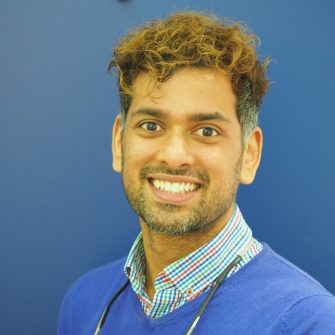
Deshan Sebaratnam
Deshan Sebaratnam
MB BS 2010
Conjoint Associate Professor, School of Clinical Medicine, UNSW Medicine & Health – Sydney, Australia
A bit about me...
My family moved to Australia from Sri Lanka when I was five. I grew up in northwest Sydney and went to Baulkham Hills High School. I went to medical school at UNSW, graduating in 2010 with honours and making the Dean’s List.
I completed my internship at Royal Prince Alfred completing my Master of Medicine at the same time. From there, I entered the specialty training program to become a dermatologist. As part of my training, I won a scholarship to spend a year in London training at Guy’s and St Thomas’ Hospital. Once I graduated as a Fellow of the Australasian College of Dermatologists, I went on to complete the Sydney Children’s Hospitals’ Network Paediatric Dermatology Fellowship. I’ve trained across tertiary hospitals in Sydney as well as England, Spain, and the USA.
At the moment I work at Liverpool Hospital, a few different private practices across Sydney and do a bit of rural outreach work. I’m a media advocate for the Australasian College of Dermatologists so I pop up in the news from time to time. I’m a Conjoint Associate Professor with UNSW and contribute to teaching and examination of the MD students. I’m actively involved in medical research and supervise MD honours students each year.
Quick fire Q&A
1. Do you have a favourite quote or mantra?
To those whom much is given, much is expected
2. What are you reading/listening to?
‘Unholy’ – Sam Smith & Kim Petra
‘Confidence man’ – Maggie Haberman
3. What advice would you give a student approaching the end of their degree?
Talk to people in your field a few years ahead of you and ask them how you should be approaching your career – tips to get ahead and rookie errors to avoid.
4. How do you remain resilient in your line of work?
I’m lucky because I genuinely enjoy my work. I enjoy the intellectual challenge and get a lot of fulfillment from helping my patients get better.
5. What recent habit(s) has improved or changed your life?
Learning to say ‘no’. I’m at the stage of my career where I don’t need to take up every opportunity, and I’m trying to be more selective with my time.
6. How did your time at UNSW help shape who you are today?
I feel lucky to have studied at UNSW. I’m a big nerd, so being surrounded by other academically geared students, I never felt out of place, and it helped pushed me to be the best I could. The UNSW Medicine degree is excellent, and I think our graduates are well placed to succeed when they graduate.
7. What was your most memorable experience from your time at UNSW?
Winning the UNSW MedSoc Talent quest with a ‘Single Ladies’ dance routine.
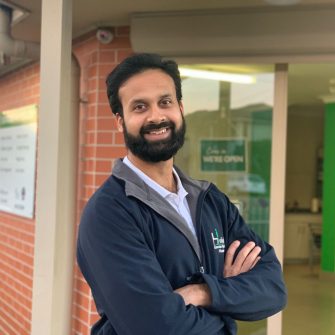
Hassan Qureshi
Hassan Qureshi
BExPhys 2015 MSc 2018
Exercise Physiologist / Business owner – Sydney, Australia
A bit about me...
I operate an exercise physiology clinic in Western Sydney. As part of my job, I get to work with a range of clients including people with physical and psychosocial disabilities, clients looking to return to work following a workplace injury or clients with various other health conditions such as cancer and knee replacements. The thing I love most about my role is the variety of clients and challenges I get to face.
Outside of work, I try to practice what I preach by staying healthy and exercising on a regular basis. I love reading and travelling. Now I enjoy going on hikes with my family and spending time outdoors.
Quick fire Q&A
1. Do you have a favourite quote or mantra?
“Begin with the end in mind”
2. What are you reading/listening to?
The Art of War - Sun Tzu
3. What advice would you give a student approaching the end of their degree?
Enjoy this time. Allow yourself to experiment, even procrastinate, but do so in a constructive way (e.g., make notes) because you never know what or who might end up helping you down the track.
4. How do you remain resilient in your line of work?
Not putting all your eggs in one basket and giving yourself options helps. But ultimately, having a sound intention and knowing why you’re doing what you’re doing helps guide you.
5. What recent habit(s) has improved or changed your life?
Better organising my thoughts/to-do lists (recently started using Trello). Also, auditing the types and amount of content I consume on a daily basis (e.g., podcasts, videos)
6. How did your time at UNSW help shape who you are today?
The greatest thing that I gained from attending UNSW, especially the second time round, is the appreciation of research.
7. What was your most memorable experience from your time at UNSW?
There are many great experiences but perhaps the moments I miss the most are being surrounded by smart people and engaging in interesting discussions.
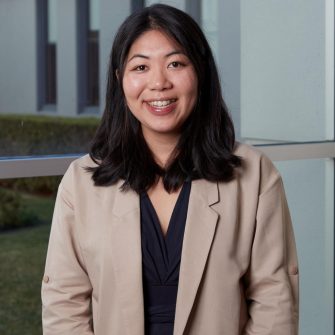
Hiroko Fujimoto
Hiroko Fujimoto
MPH 2023
Policy Research Officer at Black Dog Institute, PhD student at UNSW
A bit about me...
I’ve been working in the field of mental health research for about 7 years and started my PhD candidature this March. My health research journey began during the first couple years moving to Australia and away from home. I became interested in learning about health, after being more aware of how my diet, exercise, social support, living conditions and broader life circumstances affected my physical and mental health. It sounds obvious but I never consciously experienced this prior to moving away and taking responsibility for own life. This growing interest made me take up a Health Sciences degree with Psychology major at USYD.
After graduating, I started working on Australian-wide youth mental health research at Black Dog Institute. Through this job, I had the privilege to visit over 130 secondary schools across the country. Students were sharing their experiences via a self-report online survey. I also had opportunities to speak with students, teachers and school counsellors, about mental health challenges that young people are facing. From visiting independent schools in the city to public schools in regional areas, I’ve witnessed “differences” in access to resources and support, life circumstances and environments affecting young people’s mental health. This experience cultivated my interest and passion in mental health prevention work with a focus on social determinants of health and inspired me to start a PhD this year.
Quick fire Q&A
1. Do you have a favourite quote or mantra?
七転び八起き(nanakorobi yaoki)not giving up, keeping at it until one succeeds, falling seven times, getting up eight).
2. What are you reading/listening to?
I have recently finished reading a book called The Undoing Project. It’s a book about a friendship and life-time work of two Israeli psychologists, Daniel Kahneman and Amos Tversky. Their work on heuristics in judgement and decision making have demonstrated common errors in human psychology and have been very influential to practice in many fields including economists, health professionals, military, historians and more.
3. What advice would you give a student approaching the end of their degree?
Make the most of it and enjoy the process! I didn’t appreciate this before I started working, but it is quite amazing to have a period of time in your life that you can focus on learning, building knowledge and developing skills. Also, this is a good time to start thinking about what you want to do with that knowledge and skills – can they enable you to take up a new role or opportunity that excites you?
4. How do you remain resilient in your line of work?
I try to remind myself of the reason why I do my work and who I do it for. I also find it helpful to bring attention to my journey especially when I experience Imposter syndrome. It’s not about comparing with others. It’s about comparing to yourself yesterday. If you are one step forward from it, you’re winning.
5. What recent habit(s) has improved or changed your life?
Having a routine to do things that nurture myself and restore energy – yoga, being in nature, playing instruments, singing, time with friends and family and cuddling my cat.
6. How did your time at UNSW help shape who you are today?
The degree has given me a public health lens to see the world, a new approach to my work and a potential to make a difference.
7. What was your most memorable experience from your time at UNSW?
Having an opportunity to attend both international and national conferences to present my master’s research project, meeting other researchers in the field.
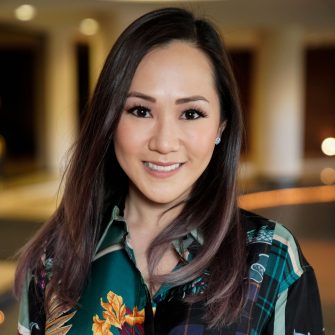
Isabelle Soh
Isabelle Soh
MBBS 2011
Primary Care Physician, Chief of Primary Care Department, Clinical Assistant Professor and at-large Board Member at Cedars Sinai Medical Group – Los Angeles, USA
A bit about me...
I was born and raised in Sydney and knew from a very young age that I wanted to be a doctor. Remember in primary school we had to do paintings of what we wanted to be? I drew myself as a surgeon in green scrubs with a sexless body on a rudimentary table and a primitive light on the side. Oh, how times have changed! I was fast-tracked through school, skipping two years and finishing year 12/HSC at 16 years of age. I knew I wanted to go to UNSW as my dad was an alumnus having completed two degrees there, and I felt incredibly lucky to be accepted into my number one university choice.
At the end of my fifth in medical school, I did an ‘away ‘rotation in Hawaii for a month and decided soon after that I wanted to pursue further training and residency in the US. While working on completing my degree, I took the USMLE Step Exams and was accepted into a Family Medicine Residency program at University of California, Davis. Then at the tender age of 22, I graduated here and moved over to the US.
Fast forward, and I have been working as a Primary Care Doctor at Cedars-Sinai, located in Beverly Hills, for the last seven years. Over these years I have taken on various leadership roles and am now one of the Chiefs and am on the Board of Directors. I love teaching Internal Medicine residents in outpatient clinic medicine, and especially love seeing Aussie who live in LA and are now my patients.
Quick fire Q&A
1. Do you have a favourite quote or mantra?
Your younger self would be so proud of how far you’ve come. Just because it’s not happening right now, does not mean it never will.
2. What are you reading/listening to?
Growing Physician Leaders: Empowering Doctors to Improve Our Healthcare by Mark Hertling.
3. What advice would you give a student approaching the end of their degree?
The world is your oyster. There is no one set pathway, and you never know what opportunities will arise. Be open and make the best decisions for yourself every day!
4. How do you remain resilient in your line of work?
Self-care and balance. Be dedicated to work and your patients, but also set boundaries so you can have space to enjoy life and reset.
5. What recent habit(s) has improved or changed your life?
Mindfulness and Zumba!
6. How did your time at UNSW help shape who you are today?
The focus on clinical integration from the beginning really gave a different perspective and foundation which contrast with that of American grads. Also, the collegiality and support amongst the cohort is unique and something to really value.
7. What was your most memorable experience from your time at UNSW?
Bonding with the other students, spending time having adventures around campus and at the Roundhouse are memories I treasure!
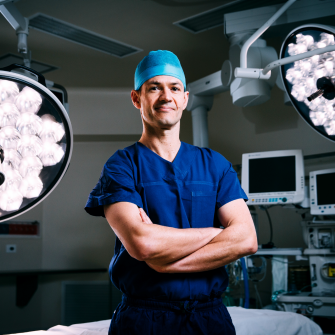
John Trantalis
John Trantalis
BSc (Med) MB BS 1997
Orthopaedic Surgeon – Sydney, Australia
A bit about me...
I am an orthopaedic surgeon specialising in shoulder and elbow surgery. I grew up in Randwick and trained as an undergraduate in Medicine at UNSW, graduating in 1997. I trained in orthopaedics in NSW and completed a further 12 months of sub-specialty training in Calgary, Alberta, Canada.
Professionally, I feel indebted to the educational system that provided me with the opportunities to be trained and to develop my skills. I am committed to trying to give back to that same system by remaining involved in both undergraduate and postgraduate teaching at all levels.
Another rewarding professional experience includes "Orthopaedic Outreach", which involved travelling to Honiara in The Solomon Islands, and allowed the opportunity to not only treat local patients with orthopaedic conditions, but to also provide teaching for the local surgeons to help establish a local orthopaedic service.
When I’m not working, in a pre-COVID world I occupied myself with travelling and spending time with my kids and friends, with our time focused on free-diving and triathlons. When I have time to myself, I very much enjoy taking part in car and motorcycle racetrack days…. the speed clears my mind.
Quick fire Q&A
1. Do you have a favourite quote or mantra?
Henry David Thoreau: (modified) If a person does not keep pace with their companions, perhaps it is because they hear a different drummer. Let them step to the music which they hear. And a poem…. "Still I Rise" BY MAYA ANGELOU
2. What are you reading/listening to?
Renegades: Born in The USA …. Obama & Springsteen Podcast.
3. What advice would you give a student approaching the end of their degree?
Keep the science in your practice, and give back as much as you can to the system that taught you… get involved in teaching.
4. How do you remain resilient in your line of work?
Teaching outreach to less developed countries, exercise, friends, and speed (I race motorbikes and cars).
5. What recent habit(s) has improved or changed your life?
Doing triathlons with my children.
6. How did your time at UNSW help shape who you are today?
My time at UNSW gave me the solid foundation to develop the skills and decision-making abilities that I use daily in countless professional situations. My affiliations with UNSW have led to me to developing a sense of being part of a “bigger picture” and understanding the responsibilities that go along with that. In addition, I developed friendships through extra-curricular activities that remain strong and I remain in contact with many of my fellow students and colleagues to this day.
7. What was the most memorable experience from your time at UNSW?
My most memorable experience from my time at UNSW is remembering the feeling that I had when I was on the grounds of the campus and the place was buzzing with activity. I had a sensation that the campus was a hive of free thinking, learning, and research, and that positive memory lives with me to this day. A few years ago, before COVID, I recall walking the grounds of UNSW campus to give a lecture, and that feeling and memory of UNSW being a sanctuary of learning and freedom of thought and expression returned to me. It was such a strong sensation that I resolved to walk my children through the campus at some stage during their secondary schooling to make them aware of the opportunities that hard work and learning can provide for them.
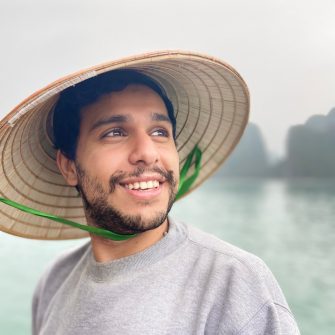
Joshua Karras
Joshua Karras
BSc 2017 MIPH 2018 MHM 2018
United Nations Association of Australia (NSW) Executive Manager – Sydney, Australia
A bit about me...
I currently hold the position of Executive Manager with the United Nations Association of Australia NSW Division and am responsible for creatively conceiving, developing, planning, promoting and executing a wide breadth of events which align with the objectives and targets of the United Nations. Most notably, I design initiatives under the guidance of the UN’s 17 Sustainable Development Goals, including Goal 13: Climate Action, Goal 10: Reduced Inequalities and most notably, Goal 3: Good Health and Well-Being. My position requires me to educate, inform and inspire the New South Wales community about these various goals and objectives of the United Nations to make the world a safer and better world for all.
Having graduated from the UNSW with an Undergraduate Degree in Vision Science, I quickly came to develop a passion in communication and International Public Health, including the future of Public Health and global health indicators. For this reason, I completed three separate master's degrees (International Public Health, Health Management and Public Health Majoring in Infectious Disease Control), whilst conducting research at the School of Optometry & Vision Science and managing a Visual Education Centre for primary school children.
My primary focus is to drive cross sectoral partnership and collaboration to deliver real world results, which maintain relevance on a local, state, national and international scale. I abide by and promote the UN mantra "We the Peoples", which aims to empower the individual to utilise their unique voice and skill set in order to enact change within their community.
Quick fire Q&A
1. Do you have a favourite quote or mantra?
“Dust if you must”. It’s the title of a short poem by Rose Milligan. Stop what you’re doing and read it right now.
2. What are you reading/listening to?
Listening to Define Dancing from the Wall-E soundtrack.
Reading Metro 2033 by Dmitry Glukhovsky
3. What advice would you give a student approaching the end of their degree?
Volunteer, volunteer, volunteer in the industry you want to work for. For me, the work experience and contacts that I made by doing this in my final year of studies ensured there was minimal culture shock and ample opportunity for me when I commenced full time work after seven years of uni.
4. How do you remain resilient in your line of work?
It can be overwhelming in my position when feeling pressure to try and tackle every societal problem at once. When things are going wrong or when I’m having one of ‘those’ days, I just try to do the very next right thing. Putting my phone on charge, drinking water, writing one email, taking that phone call.
5. What recent habit(s) has improved or changed your life?
I’m currently writing a book and I’m forcing myself to write at least 100 words a day. I find that this discipline is seeping into other parts of my life which has been unexpected and satisfying.
6. What was your most memorable experience from your time at UNSW?
Apart from meeting my soon to be wife, I would say performing a bunch of musicals with the Musical Theatre Society. Lots of great memories.
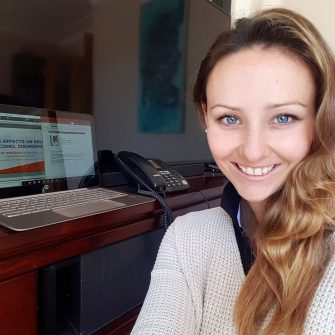
Kirrily Gould
Kirrily Gould
BExPhys 2013 MSc 2018
Senior clinician Exercise Physiologist at Fortem Australia, Exercise Physiologist at St John of God Hospital and Contractor Exercise Physiologist at Active Ability – Sydney, Australia
A bit about me...
I have always been a person who was interested in physical health and wellbeing. When I was younger, I wanted to be an elite athlete or somehow work with them. My first job was a gymnastics coach and I loved the science and psychology involved which led me to do my bachelor in exercise physiology after high school. Applying my undergrad knowledge to my coaching was amazing and useful but when I graduated I started working in a psychiatric hospital part time and decided to complete a Master of Research investigating exercise and Drug and other substances. During this time, I had three part time roles working as an exercise physiologist: Workplace prevention/ private clinic (In2Motion), St John of God Psychiatric Hospital and as a research assistant at the George Institute.
I developed my love and interest for mental health and worked very hard. Eventually I got to work at the hospital fulltime running exercise physiology interventions permanently and integrated into the usual care of clients. During this process I was able to help set up the exercise physiology programs at three St John of God Hospitals. I always wanted to stay in touch with my other clinical skills and have kept some private practice clients from Active ability.
I have been fortunate enough during my career to be involved in developing the consensus statement for mental health and exercise, presented for ESSA, UNSW and St John of God hospital at conferences, and help design the ASK mental health ESSA online program. Now I am working for an NGO Fortem.
Quick fire Q&A
1. Do you have a favourite quote or mantra?
Be strong and courageous, vulnerable and find comfort in being uncomfortable.
Fight for what you are passionate about. When you are passionate about your work it is easier to do.
2. What are you reading/listening to?
I am currently reading The Alchemist, Listening to The School of Greatness and have been recommended The 5am Club – Still need convincing on mornings
3. What advice would you give a student approaching the end of their degree?
I am a strong believer of always putting your best foot forward and connecting with supervisors, asking them about their journey of becoming an EP. Volunteer for projects and get your name out there as you don’t just want to be another number. Look into internships or experiences that you can do as a coach, allied health assistant or do as many hours as you can as a student. If you are passionate about a particular area, express this to your supervisor and gain as much knowledge as you can. It is always great to ask them questions.
4. How do you remain resilient in your line of work?
Working in mental health and rehabilitation for disability/ mental health can be quite tolling. However, I find working with a good team always helps where you are given the space to debrief and discuss difficult clients. Take breaks even if it is a good lunch break, two-week holiday or doing activities after work that help you unwind, have fun, and connect with people who support you. I love sports and activities as well as socialising. These things have always helped me remain resilient in my work.
Another thing is to realise that there is a difference between the clients presenting condition and you. I have a professional boundary between myself and my clients. I will always try to do my best for the client that is evidence based and refer on when I need to.
5. What recent habit(s) has improved or changed your life?
Meal prep – I was eating too many convenient foods. Walking before work has helped with concentration and energy levels.
6. How did your time at UNSW help shape who you are today?
At UNSW I was always challenging myself to be a part of social clubs, the exercise physiology society, doing extra hours as a clinical student and being diligent. Being at UNSW gave me the connections and friends to work hard but to also enjoy myself. I think travelling so far helped me to get a job that is slightly further out of Sydney and not worry about the travel. I love my jobs. UNSW also expects good quality students and that has been instilled into my clinical evidence-based practice.
7. What was your most memorable experience from your time at UNSW?
Foundation day—when we were in the middle of a Statistics lecture, and we had three people ride down the middle of the stairs on snowboards then he proposed to his girlfriend in the lecture. She said yes!
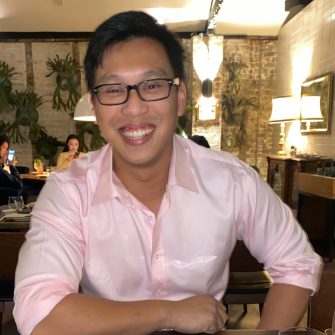
Kwan Leung
Kwan Leung
BExPhys 2013
CEO of Enable Exercise, Accredited Exercise Physiologist – Sydney, Australia
A bit about me...
I’ve always had a particular interest in sport and the functioning of the human body. Growing up, I participated heavily in sport, and in school I was drawn to the sciences. When the time came to pick my tertiary studies I married my passions with a degree in Exercise Physiology, during which I was fortunate enough to find my calling in neurological rehabilitation.
In 2017, shortly after graduating, I started my own business ‘Enable Exercise’. Five years on and I’m leading a team of specialised allied health professionals that are dedicated to helping people with neurological and physical disabilities improve their health and quality of life through exercise.
In this process I have seen, and been party to, hundreds of clients reaching their functional goals. I’ve developed an amazing team of like-minded healthcare professionals to help bring about our vision of being industry leaders in exercise physiology in the neurological space. I’ve also been involved in the UNSW neuromuscular rehabilitation course (HESC- 3592-) as a tutor to give back in some small way while conveying my passion to upcoming EP’s.
Being a business owner doesn’t leave an excess of downtime, but when I get it, I still enjoy playing basketball, performing traditional lion dancing, and spending time with friends and family. Pre-COVID I savoured the chance to travel, eat out and have a drink or three (vertically).
Quick fire Q&A
1. Do you have a favourite quote or mantra?
“If you love what you do and it's making you happy, all of the hard work and perseverance will pay off." Kobe Bryant
2. What are you reading/listening to?
Limitless by Jim Kwik. I’m listening to the audiobook and it’s all about upgrading your brain, learning anything faster and unlocking your exceptional life.
3. What advice would you give a student approaching the end of their degree?
Small changes and habits started now compound over time. Start building good health/wealth/self-improvement habits now and these will pay exponential dividends in your future.
4. How do you remain resilient in your line of work?
Self-serving motivations flop in hard times. I strive to develop a giving, growing and gratitude-based mindset, so when faced with adversity (which there has been ample of late) you will pull through, because you’re working for something greater than yourself. This has worked for me for years.
5. What recent habit(s) has improved or changed your life?
I have recently adopted the habit of consciously seeing things through to completion. Previously, my procrastination would lead me to take on multiple tasks simultaneously. I would feel busy, and half complete a lot, yet achieve little. This new habit has improved my life and work dramatically. By completing one task at a time, I stress less and see better results.
6. How did your time at UNSW help shape who you are today?
The person I am today is a culmination of my past experiences. My time at UNSW was not only formative, but instrumental in the direction I took in life.
During my studies I was surrounded by peers from all walks of life, fostering a respect for the value and contribution anyone can make.
I was exposed to professors and tutors who were experts in their field. They gave their expertise liberally and inspired me to reach similar heights in my profession.
And not to mention the lifelong friendships, relationships and networks that came along the way.
… oh and I also learned things there that I needed to pass my exams.
7. What was your most memorable experience from your time at UNSW?
One memory of my time at UNSW that remains vivid was the late-night session in the anatomy computer labs before exams. There’s something about the combination of exam stress, late night quiet, and being surrounded by cadavers that is conducive to staying focussed.
That experience aside, there were many memories from the social side of UNSW that I cherish. Like the times I spent having lunch with friends on the library lawn, exploring/getting lost in the old main building before class and the countless Uni parties I can vaguely remember but I know I had a good time at.
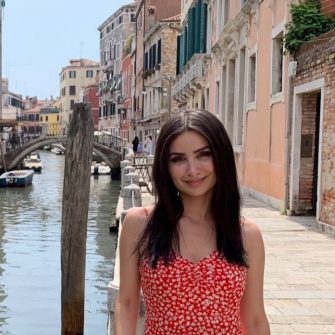
Layal Naji
Layal Naji
BSc (Major Vision Science) 2015 BOptom (Hons) 2015
Lecturer of Vision Science and Optometry at the University of Canberra – Australia
A bit about me...
I am a lecturer of Vision Science and Optometry at the University of Canberra, and a UNSW School of Optometry and Vision Science (SOVS) alumnae with Honours and therapeutic endorsement. My previous experience with UNSW SOVS includes clinical supervision and practising Low Vision optometry with Guide Dogs NSW. I have also locummed all around Australia including regional areas of Queensland, NSW, Victoria, Tasmania, and South Australia.
Academically, I am interested in public health, neuro-optometry, and ocular manifestations of chronic lifestyle related diseases. My strength in Optometry lies in diagnostics and approaching a clinical case the same one might approach a complicated jigsaw puzzle. Being passionate about improving access to eye care – and on a broader scale to health care in Australia. I co-established the outreach optometry clinic at the Asylum Seekers Centre in Newtown with UNSW SOVS. In my present role, I have facilitated placements that include vision screenings for schools with a low SES, or higher First Nations and/or refugee population.
I love my hobbies that include writing blogs, making animations, and cultural consulting for drama productions. I also love watching movies; my favourite genres are psychological thrillers, dramas, and comedies. In saying that… there is always a special place for trash TV in my life! I also like to walk and stay active, more so as I have a strong love of cooking and food.
Quick fire Q&A
1. Do you have a favourite quote or mantra?
“With hardship comes ease”: Things are never all bad or all good; even when you are dealing with obstacles, try to move your attention to something that is going right. Often, we overlook or take these things for granted.
2. What are you reading/listening to?
My favourite artist is the Weeknd, and I am listening to him on repeat until his concert.
3. What advice would you give a student approaching the end of their degree?
Towards the end of your degree you are more likely going to be involved in some field work or work integrated learning: I would make the most of these opportunities and try to see how what you have learnt in theory has a practical or real-world application.
It’s less important to memorise things at this stage, and more important to look to higher levels of cognitive learning (like evaluating and creating). Real life examples can be a nice catalyst to help you develop these higher levels without it feeling so much like studying!
It is also a good idea to network and evaluate what you like or don’t like about certain workplaces or opportunities. That way, when it is time to make decisions about your employment, you will have more options and more of an idea on what you are looking for.
4. How do you remain resilient in your line of work?
Being a young ethnic woman from South West Sydney, I have come across my fair share of obstacles. I believe much of my resilience comes from my passion for what I do and the impact it has on those around me (my patients, students, and marginalized groups within the community). The other source of my resilience comes from my desire for financial independence and security for my family.
5. What recent habit(s) has improved or changed your life?
Learning to let things go. I feel like stress can be positive to a certain extent, beyond which it just has a detrimental role to your wellbeing. Learning to find that line where I can try my best, but still live in the moment and not let a stressor or project consume me has had a positive impact on my life. It is always good to remember that we can’t control everything - life has to have an element of chaos to it!
6. How did your time at UNSW help shape who you are today?
My time at UNSW was the first time I had to juggle academic pursuits and ‘real life’/adulthood. It really taught me that life is a juggling act and helped me realise my foundations in life (such as my family, health, career, wellbeing, etc).
My time at UNSW contributed to me developing resilience, my passion in my career, and still taught me that an assessment outcome doesn’t define my clinical ability or worth in my field (or outside). I also learnt how to look and speak in a presentable manner even whilst being sleep deprived!
7. What was your most memorable experience from your time at UNSW?
My most memorable experience from my time at UNSW was when my father had developed an ocular (eye related) pathology. At the time, there was limited treatment for this presentation in Australia. My lecturer and clinical educator at UNSW (and Centre for Eye Health Kensington) allowed me to bring my dad in to the clinic, test his eyes, supported me with interpreting the clinical results, and helped me consider treatment options to pursue for my dad via tertiary care (specialists). I was really grateful to my lecturer for helping my dad’s outcome, but this experience also helped me develop my love for diagnostics and understand the impact that good clinical decision making and evidence-based practice can have on a patient’s outcome.
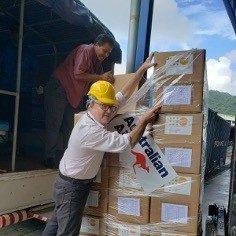
Lindsay Sales
Lindsay Sales
MPH 1988
Director, Medical Compliance at e-Protego – Chiang Mai, Thailand
A bit about me...
Health related work has taken me to 45 countries providing field experience in developing, transition and mature economy settings rebuilding and improving health sectors in post disaster, humanitarian and national reform situations. I undertook strategy and organisation studies in the US which added considerable value to my Australian learning. It demonstrated that I had a very health-centric view of the world and challenged me with an array of different thinking that expanded my perception and approach to health issues. My passion is to be involved with reform and repair of health systems involving local communities, government agencies and private sector people so they can create their own contextual system of sustainable, resilient and accountable prevention, care and treatment.
In delivering these results I have been engaged by governments, the UN, the World Bank, the Asian Development Bank, DfID, the EU, not-for-profit and private sector organisations. My roles include Program Director, Chief of Party, Team Leader and Technical Specialist. Specific areas include health sector reforms, health service delivery with a focus on primary care, hospitals and HIV, disaster recovery, infrastructure, trade and development. A contributing foundation for my international development expertise was gained in posts including clinical roles, operational roles as CEO/COO of hospitals and policy roles including Deputy Director General of Health. My experience includes health finance and payment systems, start-ups, reengineering to increase operational effectiveness, major development projects, performance-based contracting, precision medicine, standards, regulation and accreditation. I am currently implementing a disruptive start-up involving the e-health ecosystem supporting universal access to performance based compliant primary care.
Quick fire Q&A
1. Do you have a favourite quote or mantra?
The sophistication is in the simplicity.
2. What are you reading/listening to?
‘Colin Hay, Waiting for my Real Life’ and his catalogue of great music from his Men at Work and solo periods.
3. What advice would you give a student approaching the end of their degree?
Your colleagues and contacts are invaluable for downstream employment. The health scene/sector in Australia is important and beneficial to know. However, there is a richness of diversity that will be found when working in other nations, settings and circumstances. Be open to the difference, listen, never stop learning, consider taking sensible risks. Collective experience, discovery, knowledge and flexibility adds substantial contextual and creative value promoting your capacity to make a worthwhile contribution.
4. How do you remain resilient in your line of work?
I am involved in a diverse range of activities that mostly relate to a broad interpretation of health. Examples include aerobic waste to energy systems, proposals for pharmacies to administer UK Corona Virus rapid tests in South-East Asia, developing an e-health ecosystem gold standard, development of executive health management training programmes for Gulf countries and volunteer health advisory support for a rural village in Thailand. This involves a variety of people from within and external to the health sector represented by a wide range of ages from a spectrum of communities. Being able to contribute and add value has been important for me to ensure relevance in my work.
5. What recent habit(s) has improved or changed your life?
Becoming accustomed to residing in rural Thailand, versus periodically returning from international consultancies. 18/6 intermittent fasting. Teaching students online versus face to face. Avoiding toxic people wherever possible. Long motorbike rides through the rice paddies adds to life’s enjoyment.
6. How did your time at UNSW help shape who you are today?
It increased my confidence being able to successfully compete with medical colleagues. Certainly, it proved useful with job applications. The scope of the course has proven invaluable – health planning, law, finance, economics, functional design, governance. Teamwork involving a range of health professionals.
7. What was your most memorable experience from your time at UNSW?
The constant pressure to produce and submit course requirements. Studying with a newborn baby. Enjoyment from getting to know and work with fellow students and the academic staff.
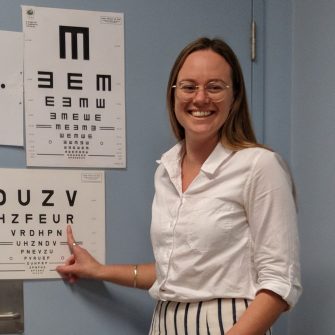
Lowana Littlechild
Lowana Littlechild
BSc (Major Vision Science) 2017 MOptom 2019
Optometrist – NSW North Coast, Australia
A bit about me...
I am an optometrist, living in Yamba on the North Coast of NSW. I grew up in the local area and moved back after graduating from UNSW Sydney with a Bachelor of Vision Science/Master of Clinical Optometry in 2018. I currently work at an independent optometry practice, providing full-scope care to patients of all ages. I also regularly consult at an Aboriginal Medical Centre on Gumbaynggirr land.
I find regional optometry both challenging and rewarding. With the combination of limited ophthalmology services in our region and an ageing population, we manage more complex cases than our metropolitan-based colleagues and work closely to co-manage many of our patients with local ophthalmologists.
In my spare time I enjoy staying active - be this at the gym, running, hiking, or umpiring and playing netball. I also love to travel - especially now COVID-related restrictions are in the past!
I am a big advocate for work-life balance, and the lifestyle we have on the North Coast highly conducive to this - with beautiful beaches, great weather year-round, and none of the traffic and congestion of the big city.
Quick fire Q&A
1. Do you have a favourite quote or mantra?
I live by the concept of ‘No matter what you do in life - go hard or go home’ - be this related to personal, professional, academic, or competitive endeavours. Everything you do, give it everything you’ve got.
2. What are you reading/listening to?
I have recently been reading ‘The Body’ by Bill Bryson. I am not usually a big nonfiction reader, but this was gifted by a friend and it has been a fascinating and well-written read, with some biological facts I already knew and others I didn’t. Ordinarily I am an avid podcast listener, with my favourites being from the personal finance and true crime genres.
3. What advice would you give a student approaching the end of their degree?
Look forward to the career you have ahead of you, but at the same time enjoy your university days. Don’t be afraid to fail while you are learning, because you learn more from the things that go wrong than those that go to plan.
4. How do you remain resilient in your line of work?
Having a good support network is key - both mentors within my profession, work colleagues and support staff, and family and friends outside of the professional space.
5. What recent habit(s) has improved or changed your life?
Becoming a morning person. As someone who would struggle to make a 9am class in my early years of university, I now love waking up early. Moving my body, doing any chores that might need to be done or simply getting some fresh air before starting work always makes my day better. I have found that it is not motivation that is required, rather creating habits and routines that become your daily normal through consistency.
6. How did your time at UNSW help shape who you are today?
My time at university was challenging - optometry as a degree was demanding, and doing this away from family while living in one of the most expensive cities in Australia at times took its toll. However, this built my capacity for resilience and made me the person and optometrist I am today.
7. What was your most memorable experience from your time at UNSW?
Coming from a small regional town and having no family or friends in Sydney, I spent my first two years of study living on campus at Goldstein college. Here I created some of my most-cherished memories, made lifelong friendships and met my future husband. The support networks I created throughout these times were what helped me through my studies and continue to help me to this day.
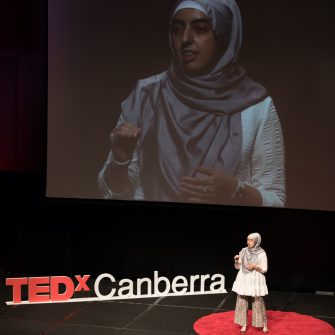
Marrwah Ahmadzai
Marrwah Ahmadzai
BMed 2017 MD 2017 MPH 2021
Obstetrics and gynecology registrar, writer, speaker, advocate – Canberra, Australia
A bit about me...
I am a training registrar in the field of obstetrics and gynaecology. I am also a vocal advocate on anti-racism. My own encounters with discrimination catalysed this work and I wrote about them for the ABC, NSW Doctor and SBS. My story then led me to the TEDx stage, where I spoke about the power of storytelling in breaking down barriers.
I now combine my two passions of women’s health and anti-racism and focus my advocacy on raising awareness about the deleterious health impacts of racism and the importance of culturally safe healthcare. Some examples include my collaboration with Jean Hailes for Women’s Health in developing a resource for clinicians on improving access to reproductive healthcare for migrant and refugee women. I have spoken about tackling racism in women’s health during International Women’s Day at a panel discussion for the Royal Australian New Zealand College of Obstetricians and Gynaecologists. I have also written an article about care of people with diabetes in Ramadan to inform clinicians about the spiritual significance of this month, to help improve understanding of why many choose to fast despite medical advice not to do so and how to tailor care accordingly.
My other interests include medical leadership and education. I am a member of the Canberra Region Medical Education Council education committee and a fellow of the Higher Education Academy. I was a finalist in the 2022 Australian of the Year Awards and recipient of the Australian Capital Territory Government Multicultural Champion Award.
Quick fire Q&A
1. Do you have a favourite quote or mantra?
“Take advantage of five before five: your youth before your old age, your health before your illness, your riches before your poverty, your free time before your work, and your life before your death.”
Prophet Muhammad (peace be upon him)
2. What are you reading/listening to?
I have just started listening to Birthing and Justice – a podcast by Dr. Ruth De Souza. It is an interview series about birth, racism, and cultural safety.
3. What advice would you give a student approaching the end of their degree?
Seek mentors to help you navigate the challenges of entering the workforce. Maintain interests and pursuits outside of medicine. This is not only vital for your wellbeing but will diversify your skillset and make you a better doctor.
4. How do you remain resilient in your line of work?
I know when to seek help and regularly debrief with friends and colleagues about challenging clinical experiences. I seek solace through prayer. I try to maintain a gratitude mindset. And I regularly reflect on my progress and opportunities for growth.
5. What recent habit(s) has improved or changed your life?
Taking leave. I would seldom take leave in the past, saving it for when I might need it. I eventually realised this was not serving me and I had so much leave banked up. I now request regular leave, and this has really helped me reset at intervals and prevent burn out.
6. How did your time at UNSW help shape who you are today?
UNSW provided me a nurturing environment to develop academically but also inspired me to strive to do more. At UNSW there was always a lot happening in the socio-political arena. There were so many opportunities to get involved in advocacy and leadership and I developed my sense of community and passion for advocacy there. At UNSW I was also involved in teaching anatomy, pathology and clinical skills which served me well as a junior doctor interested in teaching. I also benefitted from the dedicated research year as it taught me a lot about research which is something we are expected to do as doctors but often do not have adequate time or training in.
7. What was your most memorable experience from your time at UNSW?
Many of my memorable experiences were the simple things. As a junior medical student, I loved Associate Professor Ute Vollmer-Conna’s lectures – she always really lightened the room. I loved soaking in the energy and activity on campus on my daily walks from the main gates up to the Wallace Wurth building. I enjoyed my once a week Stockmarket salad.
I am also so grateful for the many clinical experiences that I had. A memory that comes to mind from one of my clinical placements is attending a laughter club at a community health centre. This was a once weekly session attended by elderly women from that local community who would stand in a circle and spend the whole session laughing as a wellbeing initiative. As the medical student on placement, I would participate as well and I used to leave that session with a big smile on my face and feeling refreshed each week.
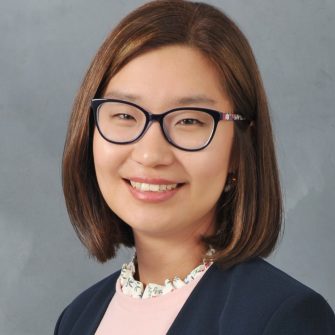
Myung Seo (Ria) Ko
Myung Seo (Ria) Ko
BMed 2013 MD 2013 MPH/MHL&M (currently enrolled)
Infectious Diseases Advance Trainee at Prince of Wales Hospital – Sydney, Australia
A bit about me...
I am a mum of one, a doctor-in-training in the discipline of infectious diseases, a medical project consultant for a clinical documentation consultancy company, and a postgraduate student at UNSW School of Population Health. I am 33 years old. I grew up in South Korea before moving to New Zealand in 2004, then I moved to Sydney in 2008 to start my medical degree at UNSW. I’ve been living and working across the states and territories of Australia since and I currently live in Sydney.
Post-graduate medical training is a long journey, often longer than the medical degree itself. I took what I call a ‘scenic detour’ from my training journey a few years ago to study health management and artificial intelligence and to work in health administration and economics. I took this experience back to my clinical workspace and have been working closely with the Health IT teams and the business intelligence unit on several projects for improving efficiency and quality of day-to-day clinical services.
Outside of work, I enjoy playing with my 2-year-old son Harry and my rescue dog Bodhi at the local parks, watching and taking photos of native birds, cooking exotic meals, and feeding them to my family and friends, and working on DIY home improvement projects.
Quick fire Q&A
1. Do you have a favourite quote or mantra?
I have several:
The secret to happiness in life is to eat well, sleep well, and poop well – my mum (suggesting finding happiness can be as simple or complex as you want it to be)
Everything is going to be okay in the end. If it’s not okay, it’s not the end. – John Lennon
My family values (EAGLE): Excellence, Adaptability, Gratitude, Loyalty, Empathy
2. What are you reading/listening to?
Emotional Female by Yumiko Kadota
Love stories by Trent Dalton
Phosphorescence by Julia Baird
Many children’s bedtime stories and nursery rhymes
3. What advice would you give a student approaching the end of their degree?
Make your life your own, but before you can do that allow yourself to experience a variety of things. Do something different and enjoy it. Whether they are seemingly relevant or irrelevant to what you are doing now or where you plan to be in the foreseeable future, if you remember who you are and why you carry on while going through them, they will come back to you one day with great fortune.
4. How do you remain resilient in your line of work?
I try and enjoy my day-to-day tasks as much as possible. Sometimes, I just have to tell myself that they are fun and worthwhile; and eventually I learn to have fun at work. If you are not having fun at work, what is the point of it?
Sometimes, there are times and places that make me want to cry. When they come, I pause everything, sit down, and cry as hard as I can. When I am done, I get up. If I need help, I don’t mind showing off my vulnerability and asking for help.
5. What recent habit(s) has improved or changed your life?
I started waking up an hour earlier so that I have plenty of time to make myself a coffee and do some reading (whether it be a book I’ve been reading, something on social media, or emails) before I get ready and leave for work. I have full control over this time, and no one is distracting me, so taking this time makes sure that I have a great start to the day. It also allows me to plan my day ahead better and make the day more enjoyable.
I started putting all my schedule into one online calendar (my personal and family life, work, and study) and I found myself much more organised than before. I colour-code the different types of events and tasks.
6. How did your time at UNSW help shape who you are today?
I have a lot to do with UNSW. At the end of this year, I will have completed four degrees from UNSW, which is about eight years’ worth of full-time studying. It shaped my professional persona. It opened so many doors for me to explore. I met numerous lifetime friends and my soulmate at UNSW.
7. What was your most memorable experience from your time at UNSW?
Many wild nights in and out as the resident of Philip Baxter College (I ended up staying for three years and became a Valedictorian of the college).
My individual learning project research year at the Translational Neuroscience Facility with Prof Gary Housley and his team.
Following a patient’s journey through brain haemorrhage, brain death certification, and organ donation at the Intensive Care Unit at Prince of Wales hospital.
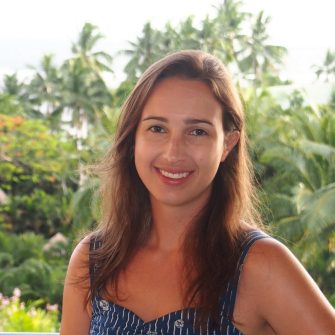
Natalie Klees
Natalie Klees
BMed 2013 MD 2013 MHM 2020
Medical Advisor, NSW Ministry of Health – Sydney, Australia
A bit about me...
I am a Fellow of the Royal Australasian College of Medical Administrators (FRACMA) and currently work as a Medical Advisor with the Office of the Chief Health Officer and COVID-19 Public Health Response Branch at the NSW Ministry of Health, as well as with the NSW Rural Doctors Network (RDN).
I studied medicine with UNSW at the Rural Clinical School in Coffs Harbour, where I developed a passion for rural health. I have worked and trained across a wide variety of locations in NSW, and while I currently call Sydney home, I look forward to returning to the country soon.
Quick fire Q&A
1. Do you have a favourite quote or mantra?
Working within the COVID-19 response team for the last 18 months, the work of Charlie Mackesy has helped me to stay the course.
2. What are you reading/listening to?
The Wheel of Time by Robert Jordan.
3. What advice would you give a student approaching the end of their degree?
My number one piece of advice would be to enjoy yourself. If you aren’t already working a full/part-time job, then the period between finishing your degree and starting your career is one of the most wonderfully free times of your life. Enjoy it to the fullest!
When you start your new job, remember that you don’t have to know everything. One of the most important things is knowing your limits and asking for help. Take care of yourself, particularly as healthcare can be challenging physically, emotionally, and mentally.
4. How do you remain resilient in your line of work?
I strongly recommend having good support networks both inside and outside of work. The key there is having both – sometimes you need to have an unmoderated vent (not necessarily appropriate for colleagues), and other times you need to bounce a situation off your peers to gain insight from people who understand the clinical / workplace context.
Secondly, having an interest outside of work that is not work-related (please note that studying or preparing for exams is not a hobby) is essential. It helps to have something positive to look forward to when you go home, and to find fulfilment in other areas of your life. Having an identity beyond medicine / work is so important – because when something goes wrong at work (and it will), you can draw upon these other aspects of your life as a support. They will help you realise that it was just an honest mistake / bad interaction, and not a reflection of who you are.
5. What recent habit(s) has improved or changed your life?
After gaining my Fellowship I have started teaching myself to sew. It has been wonderful to have a hobby outside of work, particularly one that allows me to channel my creative side.
6. How did your time at UNSW help shape who you are today?
Training at the UNSW Rural Clinical School in Coffs Harbour was the catalyst for my current passion for rural health. I am incredibly grateful for the opportunity to live and train in such a beautiful regional area, which allowed me to develop long-standing ties to community and country.
7. What was your most memorable experience from your time at UNSW?
As a medical student in a rural area, you often find you are given a much more “hands on” training experience than metropolitan facilities. My most memorable instance of this was assisting the (successful) resuscitation of a colleague who had a cardiac arrest. It was incredibly humbling to be part of a high-performance team who worked together seamlessly in an extraordinarily challenging situation.

Niroshan Jeyakumar
Niroshan Jeyakumar
BMed 2019 MD 2019 BSc (Med) Hons 2019
Neurology Advanced Trainee, Westmead Hospital – Sydney, Australia
A bit about me...
Hi everyone, my name is Niro. I’m 28 years old, Sri Lankan Tamil and a Neurology Advanced Trainee at Westmead Hospital. I grew up in Carlingford and studied Medicine at UNSW, including an Honours year looking at the neurophysiology of postural reflexes. After graduation, I started working at Westmead Hospital as a junior doctor and have been there ever since. Last year, I came first in Australia and New Zealand in the Royal Australasian College of Physicians specialty entrance examinations.
Outside of clinical practice, I am engaged with research into conditions like Parkinson’s disease, Huntington’s disease and MOG antibody disease, a multiple sclerosis-like condition that is the focus of my current Masters project. Studying for exams and conducting research whilst working as a doctor has been busy, but I love my job. In neurology, I work with incredibly talented colleagues, routinely deal with complex and fascinating cases, and, most importantly, have the chance to try and help people with what I have learnt every day.
In the future, I want to work on unpacking the mechanisms that underpin neurodegeneration so that we can create ‘disease-modifying therapies’ capable of not just treating symptoms but the underlying disease process itself, maybe one day even a cure. If we can achieve that, I think that will change the world. Outside of Medicine, I love tennis, going to the beach, a good story – in books, film or theatre, and good food.
Quick fire Q&A
1. Do you have a favourite quote or mantra?
“With great power comes great responsibility.” – Uncle Ben
2. What are you reading/listening to?
“Elusive: How Peter Higgs Solved the Mystery of Mass” by Frank Close
3. What advice would you give a student approaching the end of their degree?
Travel, read, spend more time with family and friends, dive into the hobby or project you’ve been thinking about but never started, do all the things that you want to do but feel there isn’t time for because there is only less time later!
4. How do you remain resilient in your line of work?
I think resilience requires three key ingredients.
First and foremost is support and I am really lucky to have an unconditionally supportive family (my incredible wife, mum, dad and brother) and friends (the same gang since high school) who have been in my corner my entire life. Without them, I would not have gotten very far at all.
The second is perspective. Rarely is anything as bad as it seems when you put it in perspective. That includes in perspective of the greater struggles of others less fortunate than us and in perspective of everything that is good in our lives apart from that one difficult moment right now. I’m going to sneak in a second quote here, from Doctor Who, that puts it best: “Every life is a pile of good things and bad things. The good things don’t always soften the bad things, but vice versa, the bad things don’t always spoil the good things and make them unimportant.”
Finally, one needs a sense of purpose. If you are grounded in what you aspire to do or who you aspire to be then you can always motivate yourself to get through the difficulties that stand in the way of achieving that. In Medicine, we are lucky because you don’t need to look far to find something worth struggling for. There are a great number of people we are privileged to be able to help but also many that we have no power to because the answer is too obscured to see or the science hasn’t been figured out yet so I try to reshape the challenges I face (like going to see consults at 10pm after being at work since 8am the day before because of a rough overnight on-call) as experiences that might teach me something or force me to improve in some way, and, if one day, when somebody very sick is counting on me to help them because no-one else can figure out how, what I learnt today makes all the difference, then it’s worth it every time.
5. What recent habit(s) has improved or changed your life?
Reading novels – I used to read voraciously when I was younger but fell out of it in university and early working life amidst exams and work commitments. I got back into it recently and was reminded of the unique clarity of mind you reach when reading, beyond the enjoyment of a great story, which is already distinctly satisfying. I think it’s because reading removes you from your usual thought patterns, giving you a break from the day-to-day stresses, but still engages your mind in a different way, which leaves you feeling energized afterwards. I imagine meditation works in a similar way, but I’ve never managed to master that.
6. How did your time at UNSW help shape who you are today?
My time at UNSW shaped who I am greatly, mostly because of who I spent it with. I was fortunate to share my degree with my best friends from high school, who are the same people I started hospital internship with and the same people who stuck around for physician training too so I have the unique privilege of being able to say that I spent nearly my entire education and training – coming up to 17 years now – alongside the same guys I got in trouble with for mucking around in art class. I think the great culture of camaraderie and working together at UNSW was a big part of facilitating that experience.
7. What was your most memorable experience from your time at UNSW?
My most memorable experience would have to be the three months in the summer between 5th and 6th year when my friends and I did our overseas elective placements. We did placements in Colombo and Cambridge and travelled across Sri Lanka and Europe in between. It was really an unparalleled experience and the highlight of the UNSW Medicine program without a doubt.

Paula Conroy
Paula Conroy
MHLM 2023
Founder and CEO - Insight Health Advisory
A bit about me...
I’m a GP with a deep passion for helping people stay well, not just get better. Over the years I’ve worked across a range of medical roles, but I’ve always been drawn to prevention and the question: what if we could stop illness before it starts?
These days I’m the founder of Insight Health Advisory, where I focus on bringing evidence-based, preventive health to people with full lives, especially busy professionals who often put themselves last. Whether it’s through education, strategic guidance or speaking, my goal is simple: to make credible health information accessible and empowering.
My “why” has always been about helping people be healthy in the truest sense – not perfect, but well enough to live fully, enjoy the little things, and keep showing up in life.
I’m endlessly curious about how we live, work and take care of ourselves. I believe a bit of knowledge, shared the right way, can go a long way. That’s why I’m passionate about using my medical expertise beyond the clinic to help people understand their health and take practical, preventive steps that fit real life.
Quick fire Q&A
1. Do you have a favourite quote or mantra?
“This too shall pass”. My darling Mum has always said it; life isn’t always easy, and things will challenge you, but these times don’t last and the sun will shine again.
2. What are you reading/listening to?
I'm reading The Click Moment by Frans Johansson - a fascinating look at how unexpected opportunities shape our paths. I’m also enjoying The Diary of a CEO podcast. The guests offer real insight into navigating work, health and life.
3. What advice would you give a student approaching the end of their degree?
You don’t need to have it all figured out. I’ve had lots of different roles, but curiosity and following what felt meaningful has always led me in the right direction. Stay open to new opportunities and don’t fret about the future too much. Things rarely follow a straight path, and that’s often where the most interesting work shows up!
4. How do you remain resilient in your line of work?
When things feel full on, I try to practice what I preach and come back to my self-care “SNACKS”
Sleep
Nutrition
Activity
Connection
Kindness (to self)
Sunlight
They're simple but powerful and help me reset, stay grounded, and keep showing up.
It’s also important to just have some fun and let go every now and then!
5. What recent habit(s) has improved or changed your life?
Writing “morning pages” and journalling each day. It’s a daily brain dump that clears the mental clutter. It gives me clarity and helps me stay intentional, especially when life feels full.
6. How did your time at UNSW help shape who you are today?
Studying health leadership at UNSW helped me think more strategically about systems and change. The mix of theory, practical tools and diverse perspectives shaped how I approach my work today, especially in navigating health outside of traditional clinical settings.
7. What was your most memorable experience from your time at UNSW?
Learning alongside peers from so many backgrounds really stayed with me. It opened my eyes to how much richness there is in different experiences, and how important that is when leading or advising in health.
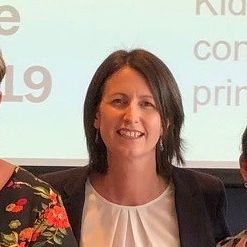
Paula Katalinic
Paula Katalinic
BOptom (Hons) 1999 GradCertOcTher MOptom 2010
Professional Services and Advocacy Manager, Optometry NSW/ACT – Australia
A bit about me...
I grew up in the country, just outside Albury NSW, and attended Albury High School before relocating to Sydney in 1995 (living in the old Basser college) to study a Bachelor of Optometry. I later undertook further studies at UNSW including a Graduate Certificate in Ocular Therapeutics and a Master of Optometry. It has been exciting to watch the optometry profession transform over the past 25 years and I’m thankful to have had the opportunity to work with so many passionate people in the eye care sector.
After graduation, I worked in a full scope optometry practice in regional NSW then relocated to Boston, USA, where I was involved in a large-scale teleophthalmology project at Joslin Diabetes Center’s Beetham Eye Institute for nearly four years. Other roles have included Staff Optometrist in the UNSW School of Optometry (2006-2009) and Lead Clinician at Centre for Eye Health, UNSW (2009-2021).
Since 2004, I’ve also worked with Optometry NSW/ACT, the peak body for optometrists in NSW and ACT, with my current role being Professional Services and Advocacy Manager. I continue to enjoy the opportunity to raise the profile of optometry, advocate for better eye care services, and both support and educate optometrists. I have spoken at numerous conferences and educational events both nationally and internationally and have experience with clinical research.
Outside optometry, my interests include playing the violin in the Eastern Sydney Chamber Orchestra and travelling with my husband and two boys.
Quick fire Q&A
1. Do you have a favourite quote or mantra?
My outlook is to embrace the opportunities life presents you with – both professionally and personally. For me, I had opportunities come my way that I never expected, which led to me developing specific areas of expertise I hadn’t anticipated.
2. What are you reading/listening to?
I’m currently reading All the Light We Cannot See by Anthohy Doerr
3. What advice would you give a student approaching the end of their degree?
Your degree can open so many doors for you, but the opportunities will be even greater if you make the effort to challenge yourself professionally and build niche areas of expertise. Seek out a mentor (or two or three) who work in areas of your profession that you think you may be interested in.
4. How do you remain resilient in your line of work?
By making sure I’m constantly involving myself in new activities and embracing the opportunities that arise.
5. What recent habit(s) has improved or changed your life?
I made a new year’s resolution a few years ago to listen to more music. It has been rewarding to subscribe to a music streaming service and explore new artists and genres of music.
6. How did your time at UNSW help shape who you are today?
I grew up in rural NSW so moving from the country to live on the UNSW campus was life changing for me. I embraced university life and loved studying optometry, but more importantly made lifelong friendships and met my husband of 20 years!
7. What was your most memorable experience from your time at UNSW?
It would be remiss of me not to say meeting my husband! We now have two amazing boys.
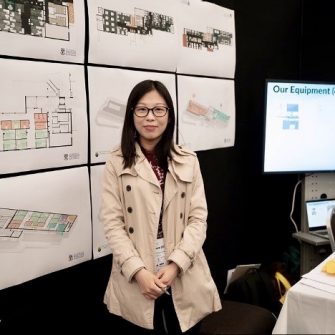
Pauline Xu
Pauline Xu
BOptom 2008 GradCertOcTher 2015 MOptom 2015
Clinic Director, Eye Health Centre of Western Australia; Senior Lecturer (Optometry), University of Western Australia – Perth, Australia
A bit about me...
I am a registered optometrist, educator, and researcher. My passion lies in providing exceptional eye care services, promoting clinical excellence, and ensuring positive patient outcomes. I also enjoy teaching and sharing my knowledge with students and peers.
My journey started as an international student at UNSW, where I faced typical challenges that come with being an overseas student. These challenges taught me to be resilient and resourceful. After graduation, I had the opportunity to experience various pathways for optometry, such as providing care in community practices as a clinician, conducting clinical trials overseas as a research optometrist, contributing to the commercialisation of novel eyecare products as a R&D project manager, and teaching the next generation of optometrists as a lecturer.
Recently, I led the establishment of Eye Health Centre of Western Australia – WA’s first and only public-facing state-of-the-art optometry teaching clinic. My goal is to create a thriving centre that offers high-quality patient care, exceptional student experience, and facilitates clinical research to guide best practices.
I am grateful for the support of my wonderful colleagues and mentors, without whom my journey so far would not have been possible.
Quick fire Q&A
1. Do you have a favourite quote or mantra?
The best preparation for tomorrow is doing your best today. - H. Jackson Brown
2. What are you reading/listening to?
I am a big fan of podcasts. My favourites are “The Intelligence” by The Economist and “Think Fast Talk Smart” by Stanford GSB.
3. What advice would you give a student approaching the end of their degree?
Be positive and principled. Choose a job that allows you to grow as a human being.
4. How do you remain resilient in your line of work?
Find a sense of purpose, show gratitude and self-compassion.
5. What recent habit(s) has improved or changed your life?
Journaling. Journaling has helped me gain perspective, regulate my emotions, and crystallise my thoughts after a challenging day, thanks to my friend's recommendation.
6. How did your time at UNSW help shape who you are today?
As a former student and staff member of UNSW, the motto of 'never stand still' resonates deeply with me. It inspires me to continue growing and committing to lifelong learning, while also believing in opportunities beyond one's degree or job title.
7. What was your most memorable experience from your time at UNSW?
It's hard to choose just one memorable experience as there have been so many, but all of them have one thing in common – wonderful people. These are the people who offered guidance when I needed it, lifted me up when I was down and inspired me to be my best self.
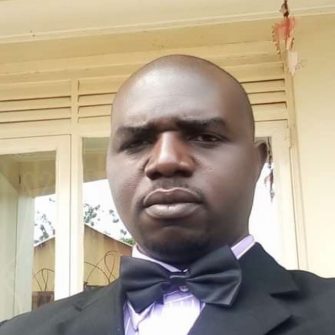
Richard Okello
Richard Okello
MPH 2012 MHM 2012
Country Implementing Manager for Catalyzing Pediatric TB Innovation – Uganda
A bit about me...
I am a medical doctor and specialist in public health and health management. I graduated from the UNSW in 2012. In the past nine and half years’ post-graduation, I have had an opportunity to work as a District Health Officer for Lira District Local Government, City Divisional Medical Officer for Kampala Capital City Authority, and as a program officer rising through the ranks to the level of Country Implementing Manager at Elizabeth Glaser Pediatric HIV Foundation Uganda.
Currently, I support a CaP TB Uganda team. My major role is to orient the National TB program towards Pediatric TB, build the capacity of health workers to manage pediatric TB along the clinical cascade, support the introduction of child-friendly Pediatric TB medicine, generate evidence to improve Pediatric TB, and sustain the best practices beyond CaP TB Project. The intention is to enable my country to increase the proportion of children diagnosed and treated for TB compared to all TB cases identified and treated from 12% to 15-20%.
As of the end of 2021, my current project has realised several achievements. The national strategic plan has pediatric TB sections for the first time. A guideline for TB prevention has included shorter regimens for preventing TB in children; 600 health workers from 40 District TB diagnostic units contribute 48% of the regional TB target (194 DTU contributes the remaining 42%).
Quick fire Q&A
1. Do you have a favourite quote or mantra?
Maa ticii (translated from Luo to English- “Love your work”)
2. What are you reading/listening to?
I love listening to Classical music - the harmony always amazes me. I also profoundly love Gospel music since it lifts my soul.
3. What advice would you give a student approaching the end of their degree?
Vast opportunity awaits you to put to use what you have learned at UNSW. If you do, you will definitely stand out.
4. How do you remain resilient in your line of work?
Prioritise tasks, learn new skills from team members and keep a reflective journal.
5. What recent habit(s) has improved or changed your life?
Listen more and talk less. You don’t have to be recognised for every accomplishment within an organisation.
6. How did your time at UNSW help shape who you are today?
Continuously learn to enable your hands to move fast in addressing emerging challenges and tasks.
7. What was your most memorable experience from your time at UNSW?
The UNSW Roundhouse, I used to go weekly and play chess with fellow students.
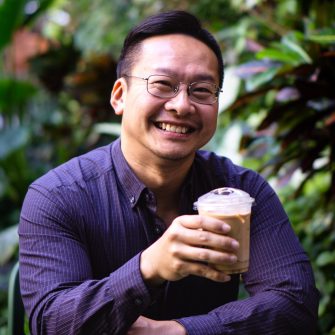
Rusheng Chew
Rusheng Chew
MPH 2019
Clinical Researcher, Mahidol Oxford Tropical Medicine Research Unit, Thailand and University of Oxford Centre for Tropical Medicine and Global Health, UK
Visiting Senior Specialist Physician, Alice Springs Hospital, NT
A bit about me...
I’ve been privileged to have seen and experienced a lot of the world in my personal and professional life. Growing up in multi-lingual and multi-cultural Malaysia instilled in me an appreciation for diversity, which has been an asset in my career. I studied medicine in the UK and worked in London before moving to Darwin in 2010. After seven-plus years traipsing around hospitals in the Northern Territory, Queensland, and Victoria, including in regional and remote areas, and taking six months out to travel, I gained specialist qualifications in Infectious Diseases and Respiratory Medicine.
I then practiced as a consultant physician for over four years in Brisbane but always knew I would be unfulfilled unless my career included academic and health leadership components. In preparation for this, I undertook Masters’ degrees in epidemiology and biostatistics at Oxford and in public health at UNSW Sydney. In addition to my clinical qualifications, these have led me to many interesting career experiences such as a migrant and refugee health consultancy for the European Union, serving as an expert witness for the Australian Government, and a clinical advisory role in the Queensland Statewide Public Health COVID-19 Incident Management Team.
In my current position I divide my time between Thailand and Australia. I spend most of the year based in Bangkok conducting multi-faceted health research in Asia as well as reading for a DPhil (PhD) at the University of Oxford, with the remainder in clinical practice in Australia. In the former role I also coordinate the very large South and Southeast Asian Community-based Trials Network, which includes sites in five countries and allows me the opportunity for frequent travel to places I would be unlikely to visit otherwise, such as rural Bangladesh.
Quick fire Q&A
1. Do you have a favourite quote or mantra?
‘Act justly, love mercy, and walk humbly’, which is from chapter 6, verse 8 of the biblical book of Micah. In this quote, God tells the Israelites that he has no need of lavish rituals but only requires his people to know right from wrong and act accordingly, to love and show compassion to their fellow man, and not to have excessive pride because any achievement is the result of the contributions of many. I walked past a mural with this quote every day when I worked at the Mater Hospital in Brisbane, and its social justice-themed message resonates strongly with me still.
2. What are you reading/listening to?
I’m currently in the middle of reading two books: Contested Space Revisited and The Cruel Birth of Bangladesh. I’m a big fan of understanding the histories and local contexts of the places in which I live and work (or have lived and worked), so much of my non-fiction reading revolves around these themes. The first book explores the urban fabric of George Town, the capital city of Penang where I’m from, pre- and post- its World Heritage Site listing in 2008. The second book tells the story, from the perspective of an American diplomat stationed in Dhaka, of the independence of Bangladesh from Pakistan.
3. What advice would you give a student approaching the end of their degree?
Give the graduation milestone the significance it deserves, but also remember two things: firstly, completing the degree is just a stepping stone towards the ambitions you hold, and secondly, don’t become so obsessed with those ambitions that you forget to enjoy the journey towards them.
4. How do you remain resilient in your line of work?
During times of high workload and high stress I concentrate on the tasks that need to be done immediately and concentrate on chipping away at them, bit by bit. I also remind myself that even the worst times will pass and that I have experienced some pretty harrowing times already, so just keep putting one foot forward. Most importantly, I have the most supportive partner and family anyone could wish for, and their love and care for me keeps me focused on the things that really matter in life. Never underestimate the power of a good support network.
5. What recent habit(s) has improved or changed your life?
I’ve always been one for vigorous exercise most days of the week, but the COVID-19 pandemic, among other reasons, has made me much more aware of the importance of self-care and burnout avoidance. Taking regular short breaks to interact with colleagues, get a coffee, or have a short walk is a good mood booster. To make my life as full as possible, I also make it a point to experience something new frequently, whether that be exploring a new place, eating at new restaurant or street stall, adding to my foreign language vocabulary, or trying a new activity – not hard to do in somewhere as vibrant as Bangkok.
6. How did your time at UNSW help shape who you are today?
UNSW has one of the most varied course offerings for MPH degrees in Australia – there were so many modules that piqued my interest and I wish I could have done them all. Studying non-clinical health-related disciplines gave me the confidence to expand my research horizons into fields like health economics and mathematical modelling, and I am now mid-way through an advanced professional certificate in machine learning and artificial intelligence. It has also made me realize the tremendous value I can bring to any health or public policy organization as a specialist physician with clinical domain knowledge plus many non-clinical strings to my bow, which I hope will facilitate future career opportunities.
7. What was your most memorable experience from your time at UNSW?
Learning to see and understand health, especially global health, from different perspectives – a truly multi-disciplinary field. It was always enlightening to hear the opinions of students and academics with different personal and professional backgrounds from my own, as well as the rationales behind their views.
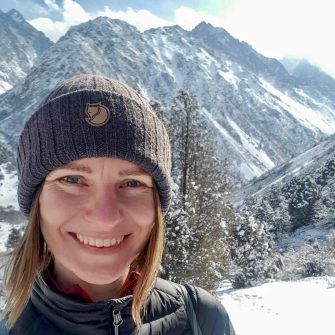
Samantha Law
Samantha Law
BMed 2015 MD 2015 BA 2015
Advisor, Deutsche Gesellschaft für Internationale Zusammenarbeit – Kyrgyzstan
A bit about me...
You’ll currently find me hiking in the mountains of Kyrgyzstan most weekends, a short journey from the capital city of Bishkek where I live and work as an advisor for the Deutsche Gesellschaft für Internationale Zusammenarbeit (GIZ) in a health system strengthening project. It’s a far cry from my college room at UNSW in Sydney and even further from the rural NSW town in which I grew up.
I studied medicine at UNSW, including three years in Wagga Wagga at the rural clinical school, before working at RPA Hospital, Sydney during my internship and residency and then as a locum in remote NSW and QLD. During these years I had developed an interest in the social determinants of health and the economic and policy decisions that impact health downstream. I followed this interest to complete an MSc in Health Policy, Planning and Financing at the London School of Hygiene and Tropical Medicine (LSHTM) and London School of Economics (LSE).
Experiencing health in such a variety of settings, from affluent Sydney suburbs to rural Mongolia, remote indigenous Australian communities, German villages, far-flung Indonesian islands, and my very own village where my parents still live has driven home the inequity that exists at every level. My work life now is motivated by policy change for equity and I’m so lucky to have the opportunity to do this every day.
Quick fire Q&A
1. Do you have a favourite quote or mantra?
“Nothing lasts, nothing is finished and nothing is perfect” from the Wabi-Sabi philosophy. Though I do also carry around a tiny piece of paper on which is written “life is better in questions than in answers” a summary of me in the eyes of a friend.
2. What are you reading/listening to?
Currently reading “Power of Geography” by Tim Marshall and “Reading Lolita in Tehran” by Azar Nafisi
3. What advice would you give a student approaching the end of their degree?
Life isn’t linear, so don’t worry too much about the direction you’re taking. Follow something you’re curious about and never be afraid of quitting something - it might just be the most courageous, important thing you will ever do.
4. How do you remain resilient in your line of work?
Knowing when not to be resilient anymore - when something at work needs to change or when I need to take a break to protect my mental health. And acting on this.
5. What recent habit(s) has improved or changed your life?
Leaving my phone outside my bedroom at night! What a relief.
6. How did your time at UNSW help shape who you are today?
Meeting so many different, interesting people with their wealth of experiences and world views to share, both students and staff.
7. What was your most memorable experience from your time at UNSW?
When I think of UNSW I think of the student room at the Wagga Wagga RCS - where we would gather for a cup of tea to debrief tough experiences on the wards or share new learnings from the day. We would have study groups and prepare for exams, we would simply gossip about the weekend or plan social events. The support, solidarity, and camaraderie that this room represented will always stay with me.
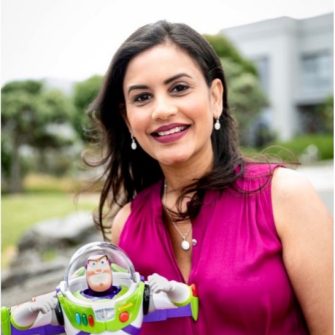
Sandhya Ramanathan
Sandhya Ramanathan
BSc (Med) MB BS (Hons) 1999
Specialist General Practitioner, Global Health Advocate, Social Media Influencer – Auckland, New Zealand
A bit about me...
I am an Auckland based General Practitioner, mum-of-two-teens turned social media influencer thanks to my globally acclaimed Covid-19 YouTube health videos. I was born in India and migrated to Sydney with my family when I was 3 months old. I graduated from UNSW Medicine in 1999, gaining prizes in Community Medicine and Psychiatry along the way. I gained my RACGP Fellowship in 2004. My family relocated to Auckland, New Zealand in 2008 after a brief stint living in Boston and New York.
In March 2020, as the reality of the accelerating global pandemic sunk in, I realised that disseminating the rapidly evolving medical information in an easily digestible form for lay people was one way I could make a tangible difference. I soon began recording self-help YouTube videos. On June 14, 2020, I uploaded my third and rather self-defining video, “Home Medical Management Plan for Mild Covid-19 by Dr Sandhya Ramanathan” outlining my carefully researched 3-step active home management plan to prevent mild COVID-19 from becoming severe. To my amazement, this video became “viral” overnight on all social media platforms helping reduce the pressure on stressed medical resources. Due to the overwhelming demand, I subsequently created 16 different language dubs of this video.
In July 2020, I created a mental health self-help video entitled: “Breaking Down Depression and Anxiety with Dr Sandhya Ramanathan” to address the rising rates of mental health issues caused by the pandemic. This video was relaunched in 2021 on commercial TV in India in all major Indian dialects. In recognition of my contribution I was awarded the 2021 “To Infinity and Beyond” award by NZ Doctor General Practice magazine, as well as a Community Service Medal by The Royal New Zealand College of General Practitioners.
Perhaps the most fulfilling aspect of my journey has been the relationship I have forged with India’s National Institute of Disaster Management (Department of Home Affairs, Govt. of India), for whom I conducted five webinars to help India’s fight against COVID-19. During India’s tragic covid-19 delta wave in 2021, I helped establish Global Medics 4 COVID to provide online medical assistance for patients in India. The icing on the cake was being given the opportunity to address His Holiness, the Dalai Lama in November 2021. I continue to share tips on healthy living on my social media pages.
Quick fire Q&A
1. Do you have a favourite quote or mantra?
I have many, here are just a few…
- Knowledge is powerful when shared
- No knowledge is too simple to share
- Eat well, sleep well, move more, love more, stress less
- Your body is a temple - worship it
2. What are you reading/listening to?
The last book that I read that really struck a chord with me was “Ikigai: The Japanese Secret to a Long and Happy Life” by Hector Garcia & Francesc Miralles. I am enjoying listening to the Link and Grow podcast interview series giving voice to the experiences of diverse women in the health workforce by Tanvi Nangrani who is a Masters in Psychology student at the Australian National University.
3. What advice would you give a student approaching the end of their degree?
Think carefully about the lifestyle you want to have and what you are passionate about and then find a way to manifest your dream career.
4. How do you remain resilient in your line of work?
By maintaining a good work life balance, regularly debriefing with colleagues, having a good sense of humour and practising gratitude.
5. What recent habit(s) has improved or changed your life?
Yoga and 16:8 intermittent fasting and of course becoming Dr YouTuber!
6. How did your time at UNSW help shape who you are today?
I feel that studying medicine is a life changing experience. My time at UNSW saw me develop my personality, travel outside my comfort zone and enriched me with the many opportunities we were given. At UNSW I learnt the art of compassionate communication as well as the ability to synthesise and summarise large volumes of information. I am blessed that these two key skills enabled me to make my mark during a global hour of need.
7. What was your most memorable experience from your time at UNSW?
There are so many wonderful memories from first year med camp to graduation day spent with my UNSW classmates! Gaining the UNSW John Hirshman International Health Scholarship for my 6-week elective term spent at the "All India Institute of Medical Sciences" in New Delhi in 1997 was a highlight. This was where I started learning “medical” Hindi which is extremely useful to my current clinical practice. In addition to this, I have somehow manifested during the Covid-19 pandemic what I wrote in the scholarship winning essay I penned in 5th year - that the greatest contribution Australian doctors can provide to help improve the health of developing countries is education.

Shaun Chang
Shaun Chang
BOptom 2009
Principal Optometrist at Eyes2Learn Optometrists Charlestown, Founder and President of Eyes4Everest, Director for Makemind Apps
A bit about me...
I enjoyed paediatric optometry at UNSW and worked for two large paediatric optometry practices after I graduated in 2008. In March 2020, I started my own practice, Eyes2Learn Optometrists, in Charlestown to diagnose and manage patients with visual dysfunction through spectacles and vision therapy. My work revolves around patients with lazy eyes, eye turns, learning disability, concussions and other neurodegenerative conditions. It keeps my job interesting.
I am now a Fellow of the Australasian College of Behavioural Optometrists and hold a postgraduate ocular therapeutics degree from the University of Melbourne and a Diploma of Financial Planning from Kaplan Business School.
Whilst trekking in the Everest region of Nepal in 2014, I was informed by a Sherpa doctor that some school children were having visual difficulties. As a result, my friends and I founded Eyes4Everest, a charity dedicated to treating preventable blindness in the mountain communities of Nepal. Every year, we bring Australian, New Zealand and Nepalese optometrists to provide eye care to mountain communities. In November 2023, we opened a permanent eye clinic in the Everest National Park.
In 2015, I partnered with an App developer to create MakeMind – a company dedicated to making IOS and Android apps for paediatric optometry.
Outside of work, I enjoy keeping fit outdoors, playing tennis and spending time with family. I am always looking for some scenic hike or mountain to climb when I travel overseas.
Quick fire Q&A
1. Do you have a favourite quote or mantra?
It is not the mountain we conquer, but ourselves – Sir Edmund Hillary
2. What are you reading/listening to?
The Calculus of Value by Howard Marks, one of his many memos.
3. What advice would you give a student approaching the end of their degree?
Find a job that will help you learn skills that will differentiate you from others in your profession. Over time, people will value your unique skills and pay you accordingly. Don’t stop learning after you graduate.
4. How do you remain resilient in your line of work?
Helping people gives me the resilience to be a better practitioner. The job is mentally challenging, so it’s important to have the right systems and people to support you.
5. What recent habit(s) has improved or changed your life?
- Creating time for self-reflection
- Having a weekly chat with someone that inspires you
- Find people that you can laugh with
6. How did your time at UNSW help shape who you are today?
My time at the paediatric optometry clinic at the UNSW School of Optometry inspired me to pursue this line of work after I graduated. I also had mentors and lecturers who believed in my potential as a great practitioner, even when I doubted myself.
7. What was your most memorable experience from your time at UNSW?
My parents made me study optometry, and for the first two years, I just studied enough to scrape through. However, seeing patients for the very first time at the training clinics made me realise what I was studying actually mattered. That has kept me going ever since.

Stephanie Yeo
Stephanie Yeo
BOptom 2009
Founder/owner operator of E Eye Place Port Coogee and Newing & Co
A bit about me...
I graduated from UNSW Optometry in 2009 and currently own two independent practices: E Eye Place in Port Coogee and Newing & Co, the latter of which is now a multidisciplinary medical centre. Our commitment to patient-centred, innovative care has been recognised with nominations for the 2025 ODMA Awards and the Telstra Business Awards.
My clinical interests lie in myopia control, specialty contact lenses, and occupational optometry. I practise full-scope optometry with therapeutic endorsement and am hands-on in ophthalmic dispensing as we have an in-office laboratory.
I began my career in community practice across Sydney and Perth, before teaching optometry in Singapore. While there, I became a Youth Expedition Project (YEP) leader, a program designed to nurture Singapore youths into active citizens - an experience that shaped my ongoing passion for mentorship and community service.
A recipient of the Women in Leadership (WLA) scholarship, I completed a leadership program that deepened my advocacy for women in business and women in STEM. I regularly present at high schools, inspiring students - particularly young women - to explore careers in optometry and science.
Outside of work, I am a mum to two energetic boys, often helping with their maths and music studies. I am also a trained cellist and active community musician, having performed with the West Australian Symphony Orchestra and at events featuring Chinese classical music for dignitaries including Anthony Albanese, Roger Cook, and Mark McGowan.
Quick fire Q&A
1. Do you have a favourite quote or mantra?
I am drawn to "the best time to plant a tree was 20 years ago, and the second best time is now." It captures both the weight of missed opportunities and the immediate possibility for action. My mantra is the acronym “MAD” which stands for “Make A Difference” - no grand gestures, just choosing to act with purpose in the moment.
2. What are you reading/listening to?
I am currently revisiting Fauré's "Après un rêve" on the cello, so I have been listening to various recordings while I work through the piece. I also picked up a fascinating book - "History of Australian Optometry" by Charles Wright AM from 1988. It has been incredible discovering the story of Harold George Pank, who was both a cellist and optometrist. The book also covers many of the important forerunners in optometry, and I had the privilege of being taught by some of their successors at UNSW, which makes the history feel very personal and connected.
3. What advice would you give a student approaching the end of their degree?
I entered optometry school at 16 under Singapore's education system, knowing I loved science, music, and helping people, but without a clear career vision. My academic path naturally led me toward optometry - a field that beautifully merged all my interests and created endless opportunities to make a difference. In many ways, I did not choose optometry; optometry chose me.
Nearly 20 years later, I am still uncovering new dimensions of this profession. My advice to students mirrors what I share with high school students as a STEM advocate for women: embrace uncertainty. You do not need all the answers now. Build strong technical foundations and meaningful relationships, stay curious, and welcome opportunities that push your boundaries. Your core passions will thread through your career in unexpected ways - and that is the beauty of professional growth.
4. How do you remain resilient in your line of work?
When my husband and I considered opening our optometry practice 10 years ago, we made a pact: we would have no regrets - as long as we gave it our all, even if we failed. That commitment laid the groundwork for my resilience.
I carried perfectionism with me for many years, but I have come to realize that running a practice means constantly making decisions without having all the answers. Not everything will go according to plan - and that is okay. I have accepted that I cannot excel in every area simultaneously: clinical care, team leadership, finances, operations, and being a present mother to my sons. Some days I crack a difficult clinical case but fall short in managing administrative tasks or finding quality time with my children. That is just part of the process.
Letting go of the need to be perfect has been liberating, even though it is still a work in progress! Rather than getting caught up in self-criticism, I now remind myself to focus on solutions and forward momentum - even as I continue to learn. My goal is to pursue excellence, knowing that mistakes are often my greatest teachers. And above all, I try to remain teachable - to stay open to growth, feedback, and the lessons that each challenge brings.
5. What recent habit(s) has improved or changed your life?
I have always had a tendency to take on a lot—balancing work, community outreach, research, parenting, staying active with my kids, and maintaining a healthy social circle. It is very fulfilling, but also highly demanding. A recent habit that has improved my life is learning to pause and prioritize rest. Rather than constantly pushing myself to do more, I have started recognizing when it is time to step back and recharge. It is important to protect my health and mental health so that I can be more present, productive, and resilient in the long run. I have come to appreciate that sustainability matters, especially as I am not getting any younger!
6. How did your time at UNSW help shape who you are today?
I am deeply grateful for the opportunity to study optometry at UNSW as an international student - made possible by the Golden Jubilee Scholarship. I vividly remember telling my mother, midway through my final semester in Singapore, that I was buying a one-way ticket to Sydney. It was my first time living abroad independently, and balancing work to support myself made the experience even more transformative, both professionally and personally. The rigorous academic environment sharpened my clinical skills and deepened my understanding of optometry. Receiving the Faculty Vacation Research Scholarship and the Most Outstanding Research Project Award fueled my passion for myopia control, research, community impact, and teaching. These experiences laid a strong foundation for my current PhD pursuit at UNSW. Throughout, I was inspired by the insights and support of my lecturers, clinical supervisors, and course mates.
7. What was your most memorable experience from your time at UNSW?
One of my most memorable experiences at UNSW was participating in vision screenings at Stewart House and working with the satellite low vision clinics run in collaboration with Guide Dogs Australia. These opportunities were incredibly rewarding and sparked a lasting passion for low vision care and community outreach, which I’ve continued to pursue in my professional career. On a lighter note, I also have fond memories of the university’s vibrant food courts, the university gym and chilling on the lawn at the Quad; it was all part of the university experience.
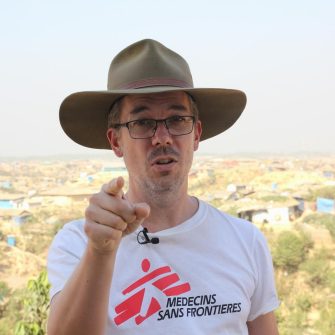
Stewart Condon
Stewart Condon
BSc (Med) MB BS 1999 MHLM expected 2025
Director Medical Services, Concord Hospital NSW
A bit about me...
I am an experienced medical generalist and have been able to combine direct clinical responsibility with team leadership, project coordination, management, and governance in both domestic and international humanitarian health contexts.
I graduated from medicine wanting to change the world and have found various ways to follow that path. My junior medical years led quickly to remote Central Australia where I was able to see first-hand first nations community health needs, balancing my time between doing clinics in Yuendumu and coordinating and overseeing Royal Flying Doctor Service (RFDS) aeromedical retrievals in Alice Springs.
Soon after this, I began my work with Médecins Sans Frontières (Doctors Without Borders) travelling to Sudan, Indonesia, Pakistan, Sri Lanka and Bangladesh. My first departure as field doctor led to subsequent missions as project coordinator and country medical coordinator. I continued to contribute to MSF by serving as a non-executive director of the MSF-Australia board between 2011 and 2020, serving as Chair and President for the last six years. My interest in governance led me to become a Graduate of the Australian Institute of Company Directors (GAICD).
More recently, I’ve moved back into hospital work and have recently become a Fellow of the Royal Australasian College of Medical Administrators (FRACMA), recognising perhaps what I’ve always known and demonstrated- it’s not just what you do, but how you do it, which makes the difference.
I currently work as Director Medical Services at Concord Repatriation General Hospital and enjoy the challenge. I keep busy when not working as a father of two, and I run when I can.
Quick fire Q&A
1. Do you have a favourite quote or mantra?
I have two favourites:
- “You’ve got to know when to hold em’, and know when to fold ‘em”- Kenny Rogers, from The Gambler
- “L’enfer, c’est les autres” (Hell is other people)- Jean-Paul Sartre
2. What are you reading/listening to?
How the world ran out of everything by Peter S. Goodman.
3. What advice would you give a student approaching the end of their degree?
Enjoy as much as you can before you graduate. I loved doing Med Revue, Medsoc, playing ultimate frisbee and traveling the world with friends from Uni. Campus life has so many opportunities it’s hard to take advantage of them all- you can literally pick and choose. So do it!
4. How do you remain resilient in your line of work?
I have the unique perspective of having seen parts of the world that are under-resourced compared to where I work now. That reality helps me put some of my current administrative challenges in context, as well as empathizing with health professionals who want the best for their patients.
5. What recent habit(s) has improved or changed your life?
Five-minute tasks! My to-do list is never done, however many of them are put off until another time (I’m very good at procrastinating sometimes). I’ve recently discovered that some of them can be squeezed in before a meeting, or straight after lunch before taking on something larger. Less cognitive load and worry about getting to the bottom of my list has helped significantly.
6. How did your time at UNSW help shape who you are today?
I started getting out of my comfort zone at UNSW in different ways, such as getting up on stage and performing or assuming representative roles. I became more comfortable being uncomfortable.
Through the course I was also able to get out of the city- I remember doing an elective in a small community near Broome, and spending time in my General Practice term at Cobar. These experiences pushed me to assess what was important to me and follow through.
7. What was your most memorable experience from your time at UNSW?
Leading the team convening and hosting the national Medical Student Association Convention in 1998. It was an amazing collaborative success, testament to lots of extracurricular hard work by UNSW and USyd students.
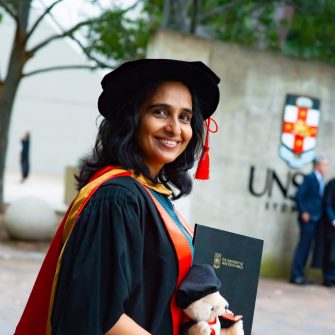
Susan Jain
Susan Jain
MIPH 2020 PhD 2020
Principal Advisor, Research Lead, Infection Prevention and Control, Healthcare Associated Infection Program, Clinical Excellence Commission
A bit about me...
My name is Susan Jain, and I am the Principal Advisor and Research Lead of the Infection Prevention and Control (IPAC) / Healthcare Associated Infection (HAI) program at the Clinical Excellence Commission (CEC), New South Wales (NSW). My role entitles the provision of expert and authoritative advice, recommendations, and innovative solutions within the NSW Health. I have over 30 years of clinical experience with over 18 years in IPAC, Intensive Care Unit and Operating Theatre.
My Doctorate in Transmission-Based Precautions complements my Master of International Public Health from the University of New South Wales (UNSW), alongside a range of internationally recognised certifications. I have published over 25 category A* publications and I hold the award of Credentialled Infection Control Professional-Expert from the Australasian College for Infection Prevention and Control. I am also a member on many state and national committees such as the IPAC Expert Advisory, International Organization for Standardization (ISO), Antimicrobial Resistance Policy (ASTAG), and an editorial board member at the Canadian Infection Prevention and Control Journal. My contributions to the field include supporting and advocating for patient, community, health worker and non-health worker safety, primarily operating in reducing the risk of Acute respiratory infections including COVID-19 transmission.
I have brought this expertise into my role to mentor, teach, and assist the development of policies, guidelines and framework. Contributing across academic centers I taught as a course convenor for PHCM9787 Infection Prevention and Control in the Healthcare Setting at UNSW and had the privilege of being a guest lecturer at the University of Sydney and University of Technology Sydney. Furthermore, my contributions extend to Pacific Regional Infectious Diseases Association (PRIDA) to implement IPAC practices in Low-Middle Income countries to develop long-term relationships with IPAC professionals.
Quick fire Q&A
1. Do you have a favourite quote or mantra?
“Move out of your comfort zone. You can only grow if you are willing to feel awkward and uncomfortable when you try something new.”- Brian Tracy
2. What are you reading/listening to?
I have just started the book “The Life Impossible” by Matt Haig. Currently I’m listening to semi-classical Hindi sung by Lata Mangeshkar, and Malayalam classics from Yesudas.
3. What advice would you give a student approaching the end of their degree?
Be prepared for the next step in your life by getting your CV ready in advance, actively engage in networking events and secure a strong support system (family and/or friends) for discussion about what is working and what isn’t.
While it’s important to get practical experience in your field to provide you with some valuable learnings, volunteering and stepping beyond your comfort zone is a great way to become a more well-rounded graduate with a holistic perspective and portfolio.
It’s also important to be prepared for the possibility that landing your dream job post-graduation might remain a dream for some time. Be prepared for anything and have a backup plan. If you put in the work, you will get what you desire. Relax and enjoy every moment of your life!
4. How do you remain resilient in your line of work?
Take one day at a time and try to be positive. Whatever you do, do it with passion. After managing a challenging situation at work, take time to think about the situation and learn from your mistakes. Even with a different perspective, reflect and try a different approach next time. Always be open to change and new learnings. Basically, never stop learning.
5. What recent habit(s) has improved or changed your life?
Focusing on what is in my control. Some factors that affect me often tend to be beyond the realms of my control. I constantly remind myself that I am only responsible for my reaction to the circumstances, and I can only change myself. Once you take responsibility, all the power is now in your hands!
The importance of having a work-life balance can also not be understated. I prioritise work based on what is important but also what is in my capacity and remind myself that sometimes I must let go of something and that’s ok.
6. How did your time at UNSW help shape who you are today?
My supervisor Prof Mary-Louise McLaws (ML) has truly inspired me to never give up and that anything is possible. She always brought me back to looking at the ‘big picture’, allowing me to gain a deeper knowledge and appreciation for not only my research area, but teaching me to the value of thinking outside the box. Prof ML had an amazing ability to connect with all her students no matter what their level of knowledge was and focus in on the real issue rather than countless dry facts. When I teach, I try and embody the tenets of what Prof ML taught me to make even the most complicated of ideas tangible and understandable to everyone.
7. What was your most memorable experience from your time at UNSW?
My most memorable experience is with my late supervisor Prof ML – her and I had a strong bond, sharing our preference for “extra hot lattes” when we would catch up to discuss my research. She was very generous with sharing her time and wealth of knowledge from her national and international experience in public health and healthcare epidemiology. During these conversations she taught me the essence of mentoring, supervision, appreciation of the value of diversity in all fields.
Four years after graduation I still retain her passion towards research, her enthusiasm to promote and enhance public safety, and adopt her teaching to accommodate diverse learning styles, pioneering evidence generation and dissemination.
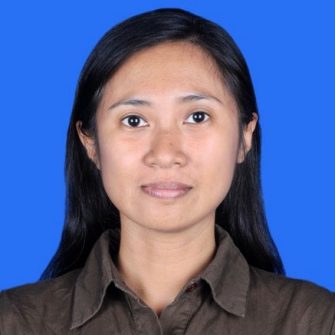
Trisya Rakmawati
Trisya Rakmawati
MHM(Extn) 2017
Officer, Health Division at ASEAN Secretariat – Indonesia
A bit about me...
My background is in pharmacy. I graduated as a registered pharmacist in Indonesia and decided to pursue a higher degree in Health Management to expand my career in the health sector. I was blessed when I received the Australia Award Scholarship to pursue a UNSW master’s degree. My interest in the health system strengthened while studying for my post graduate degree in Australia.
After completing my university studies, I returned to Indonesia where I worked with a local foundation specialising in maternal and child health through a community engagement approach. Moving forward, I worked in another health system strengthening project, focusing on the supply chain to support the uninterrupted availability of HIV/AIDS and TB medicine. During this time, I have contributed to the development of the HIV/AIDS logistic management guideline at the provincial level, which was endorsed by the local government.
Currently, I am working at the ASEAN Secretariat, an intergovernmental organisation for the southeast Asia region. My work focuses on strengthening the health system , which involves supporting and facilitating regional activities.
Quick fire Q&A
1. Do you have a favourite quote or mantra?
“Wherever you are, and whatever you do, be in love.” - Rumi
2. What are you reading/listening to?
I am currently reading a novel by Mikhail Shishkin, The Light and the Dark.
3. What advice would you give a student approaching the end of their degree?
Savor every second of it, the atmosphere, and the people around you. Stay connected with yourself, and your surroundings to identify career opportunities, and how you want to build your portfolio. Learning is a lifetime process, so never stand still.
4. How do you remain resilient in your line of work?
By knowing who I really am and holding on to my values and principles. This self-recognition helps me see my strengths. I’m not afraid to admit my flaws, and see opportunities to improve.
I also set boundaries between my work and personal life – this takes courage and consistency.
5. What recent habit(s) has improved or changed your life?
The pandemic has forced me to slow down and see everything through different lenses. To see how fragile life is, and how I have taken many precious moments for granted. It taught me how to be present; be in the moment.
At some points, the pandemic has guided me to reconnect with my old hobby of reading. It changed me by giving me the sense of finding part of myself again.
6. How did your time at UNSW help shape who you are today?
Studying at UNSW has been a great opportunity for me to experience a taste of being a global citizen. Surrounded by students and experts from different professional backgrounds, cultures, and countries of origin has enriched and shaped me to gain a systemic perspective.
7. What was your most memorable experience from your time at UNSW?
Being in a very diverse environment. As UNSW is a melting pot, there were many cultural events, such as dancing, music performances, and food markets. Each of these events brought a taste of different cultures from different countries. My time at UNSW was never a boring.
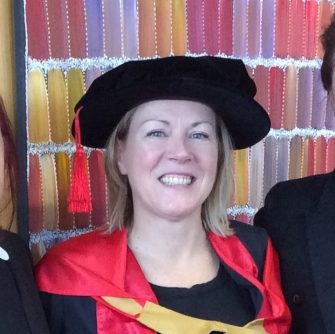
Vickie Knight
Vickie Knight
PhD 2018
Clinical Executive Rauland Australia and New Zealand
A bit about me...
Hi, my name is Vickie Knight and I am a passionate and experienced digital health Executive who enjoys delivering great customer experiences, exemplary implementation science, significant operational efficiencies, and improvements in clinical outcomes through the application of digital transformation.
I have over 30 years of varied clinical experience within the healthcare sector and began my career as a Registered Nurse on ward 17 South at St Vincents Hospital in Sydney which was the epicenter of the HIV epidemic in the 80s. I hold a Bachelor of Nursing and a Masters in Health Science Education and completed my PhD at The Kirby Institute, Faculty of Medicine & Health at UNSW.
I currently head up the Clinical Team for an Australian owned digital health technology company called Rauland Australia. Rauland transforms digital health to deliver comprehensive digital communication, collaboration and workflow solutions to healthcare organisations throughout Australia and New Zealand. Our solutions are fuelled by locally developed advanced technology, and they tackle critical health challenges, such as falls prevention, staff duress, emergency response management and streamlined clinical and care experiences, communication and workflows.
I have built a career as a Clinical Consultant specialising in clinical re-design and innovation and also have significant experience in multi-centre research and accreditation projects for the NSW Department of Health and Local Health Districts, across rural and metropolitan areas
Quick fire Q&A
1. Do you have a favourite quote or mantra?
For me, my personal mantra is based on a quote from Ciero who said: Salus populi suprema lex. The well-being of the people is to be the highest law.
2. What are you reading/listening to?
Known Pleasures podcast. Known Pleasures takes a look at the highly influential music that washed up in the wake of the seismic splash that was punk. The podcast is by three former self proclaimed amateur indie musicians I have known for years.
3. What advice would you give a student approaching the end of their degree?
Don’t get distracted or procrastinate, you are nearly there. Coming to the end of your degree can be both exhilarating and daunting. Completing a higher degree is a huge accomplishment! Take time to celebrate your hard work and acknowledge this achievement before beginning the next phase. Remember that learning doesn’t stop after graduation. Learning is lifelong so remain inquisitive and take advantage of educational opportunities to stay up to date in the field you have chosen.
4. How do you remain resilient in your line of work?
Remaining resilient in any line of work requires intentional strategies. The importance of strategies like prioritising self care and spending time with friends and family, cannot be underestimated. Physical, mental and emotional good health all help to reduce stress and assist in avoiding burnout and negative thoughts. I also believe maintaining perspective and having a positive outlook are integral to resilience. We all need to view setbacks objectively and learn from our mistakes and achievements. Lastly, the importance of social networks and connectedness is well researched. We all know the negative impact of being socially isolated.
5. What recent habit(s) has improved or changed your life?
The importance of a good night’s sleep can not be underestimated. Having a good regular sleep hygiene routine nourishes your brain and is restorative to your health.
6. How did your time at UNSW help shape who you are today?
I absolutely loved being immersed in the academic life of the Kirby Institute during my degree at UNSW. I worked with some brilliant minds and altruistic people that really encouraged me to strive to do the best I could to help end HIV transmission in Australia.
7. What was your most memorable experience from your time at UNSW?
My most memorable part of my time at UNSW would have to be my graduation. The quality and depth of the projects being awarded a PhD was mind blowing.

Wendy Saw
Wendy Saw
GradCertOcTher 2023
Hospital-based Optometrist and Community Relief Optometrist
A bit about me...
Fun-loving, adventurous and a health nut! I love learning anything new and complex! Passionate about the outdoors, and when it stops raining, keen to get back into tennis, rollerblading, pickleball and beach walks! If anyone was to describe me, the first thing they’d say is I am an absolute foodie, I am very precious about my cooking and food!
In my early twenties till early thirties, not having the skills, tools and support to deal with my mental well-being saw me running away from my own life. Unwittingly, I have been a bit of a nomad, a lone wanderer for the first decade of my career. I was known for my work as a FIFO Optometrist all over the country, but I have finally settled in beautiful WA just two months ago, and it's been a major part of my healing journey.
Gardening and sewing are in my blood, two hobbies to help anchor me, and learning with the help of Instagram and hopefully joining community gardens! I have recently discovered the interior stylist and renovator in me!
On a professional level, I believe in equal access to healthcare, and I hope to one day to work in Human Rights Law to protect the vulnerable.
Quick fire Q&A
1. Do you have a favourite quote or mantra?
Hindsight is 20/20
My dad taught me that one, but I think he was telling me from the perspective of regrets in life. For me, I don’t beat myself up about the “mistakes” I have made any more and choose to learn and see the positive. Hindsight is always 20/20. We grow more in our characters from the mistakes we made. So instead of regrets, I’ve learnt to see my history through compassion and see them as turning points. Sometimes the “point of no return” is the best place to end and start a new trajectory.
2. What are you reading/listening to?
I mainly scroll through Instagram for Gardening, Home Organisation and Personal Growth tips. I love Marie Kondo too, so I watch Netflix to be inspired with the home.
3. What advice would you give a student approaching the end of their degree?
It may be hard to find a job now especially metro, but you are still so young, and going to the country may be the best decision you have ever made financially and for personal growth. Don’t let life pressures or anyone’s pressures, which you have no control over, to control you! Focus on your career, because in the end, that’s something you can control. Find things outside of work that fulfil you, that’s something I wish I’d started sooner.
4. How do you remain resilient in your line of work?
My 13 years working in Outback Australia working as sometimes the only Optometrist in town with no Ophthalmologist, has given me a very strong backbone clinically and personally to deal with stressful days and tough times at work. I say to myself, I am the only person who has been trained to deal with this here, so it's important I remain calm and make sure the patient gets the right care. Also carving out my own personal life now has helped me to strike the perfect balance.
5. What recent habit(s) has improved or changed your life?
Taking up Gardening! Honestly moving around so much, the biggest hurdle is trying to create a new social life. Watching my seedlings grow, fills me with joy that is independent of the sometimes scary outside world. I used to be fast paced with everything: jetting off for work, rushing around, but plants teach me to slow right down, and I’m learning to enjoy a quieter life now.
6. How did your time at UNSW help shape who you are today?
Alex Hui and Michele Madigan were integral with helping me to work through an incredibly challenging time during my postgraduate degree. I would like to take this opportunity to thank Alex and Michele, who kickstarted my healing journey and were the reason I could even finish my postgraduate studies (took me ten years!). I used to have a hard time accepting any support but having them both lift me up every step of the way has changed my outlook in life. I think I am a more positive person for that life-changing experience and will remember their kindness and support for the rest of my life. UNSW absolutely has a great support network, and I am better now, and a better person because of it.
I used to feel so ashamed and embarrassed I had mental health issues, but now I want to advocate for this area! So, it’s a major change.
7. What was your most memorable experience from your time at UNSW?
My most memorable experience at UNSW would be attending my graduation with my partner and now best friend Jeffrey. Jeffrey used to run a red eye clinic in Melbourne, and we bonded over our degrees in ocular therapeutics when we first met, and how nervous we were about the oral exam.
To celebrate my achievements at the UNSW graduation ceremony with the person I love means everything to me. It was a special moment I waited my whole life for, as I didn’t get to attend my undergraduate graduation ceremony because I didn’t think it was worth attending alone.

Yvonne Lee
Yvonne Lee
PhD 2017
Head of Real-World Evidence Asia Pacific, IQVIA Asia Pacific - Singapore
A bit about me...
When I think about why I’m here and how I’m loving my job, my thoughts go back to how I was raised as a leader with responsibility and compassion. I’m the eldest child with three younger brothers. My traditional Asian parents trained me to be responsible and accountable for my younger brothers.
Loving biology, I thought maybe I should be a doctor. I left Malaysia at 18 years of age to study in New York. I met great people, friends with whom I’m still connected to. It was one of the best moments in life. I graduated with Bachelor of Science (magna cum laude) and worked at Mount Sinai School of Medicine (MSSM) as a research assistant. After two years working in the lab, I felt disconnected from my goal to help more people. I started weighting the pros and cons between medicine and a PhD. Bottom line was I wanted to serve more people through population health. So, I went back to school at MSSM for a Master in Public Health degree which led to work with Ministry of Health Malaysia specializing in clinical epidemiology and spent some time learning cancer epidemiology at IARC, WHO. Finally, I completed a PhD at UNSW, Australia.
I explored a role within the pharmaceutical industry, and I chanced upon Health Economics and Market Access in Pfizer. An exciting new career path which I spent the last decade leading and shaping the environment to support patients access to latest medical technologies. I worked with multi-stakeholders across regions to generate clinical and economic evidence to address unmet medical needs and outline values of medical technologies.
Quick fire Q&A
1. Do you have a favourite quote or mantra?
“I won't give up, no, I won't give in. Till I reach the end and then I'll start again. I wanna try even though I could fail”, Try Everything by Shakira, official theme song of Zootopia.
2. What are you reading/listening to?
Memoirs of Lee Kuan Yew and business magazines. Listening to variety of music from classicals, pop, Disney hits to Korean popular drama original soundtracks.
3. What advice would you give a student approaching the end of their degree?
Enjoy every moment of a student life. Meet new people from different faculty and network as much as you can. Take the opportunity to test new ideas and don’t be too harsh on yourself. For those who are struggling to see through the end, don’t give up. Take one baby step, one day at a time. You will finally get to the finishing line.
4. How do you remain resilient in your line of work?
First, I work in the space that interests me with room to grow. Despite, long working hours, close to 50-60 hours each week, my current role gives me a sense of purpose and fulfillment. Second, be curious and continue learning. I get motivated and excited about new ways of working to improve productivity and efficiency. Recently, I was captivated with gen-AI literature search and review where I partnered with tech data lead to build codes and deploy in our project. Third, stay in the positive zone. I am mindful of my energy level and find means to energize to help me brace through the workload and stakeholder management.
5. What recent habit(s) has improved or changed your life?
Prioritize health and stay active. With such a heavy workload, my energy depleted quite quickly through the week. I feel better physically and emotionally after exercise – restore and reset my energy level.
6. How did your time at UNSW help shape who you are today?
I embraced diversity, inclusion and collaboration. A culture that I cultivate within my current team. Our work centered around interaction with internal and external stakeholders from diverse background, across Asia Pacific countries. It’s critically important to accept, respect and appreciate unique qualities and perspectives everyone brings to the table.
7. What was your most memorable experience from your time at UNSW?
I miss the vibrant scenes and lively activities at every pocket of the campus when I walked from Anzac Parade entrance to AGSM every morning. Despite the beautiful campus scene, I had to sweat my way past the steps and short uphill walk which was truly reflective of my PhD journey.
